
COURTNEY PAULK’S ENDURANCE MINDSET
HOW LONG-DISTANCE SWIMMING MAKES HER A BETTER LAWYER


HOW LONG-DISTANCE SWIMMING MAKES HER A BETTER LAWYER
Richmond Law celebrated diversity and culture at its third annual Multicultural Night. Student affinity groups poured their talents into making this event a success: from delicious global cuisine to captivating entertainment, it was a night to remember.

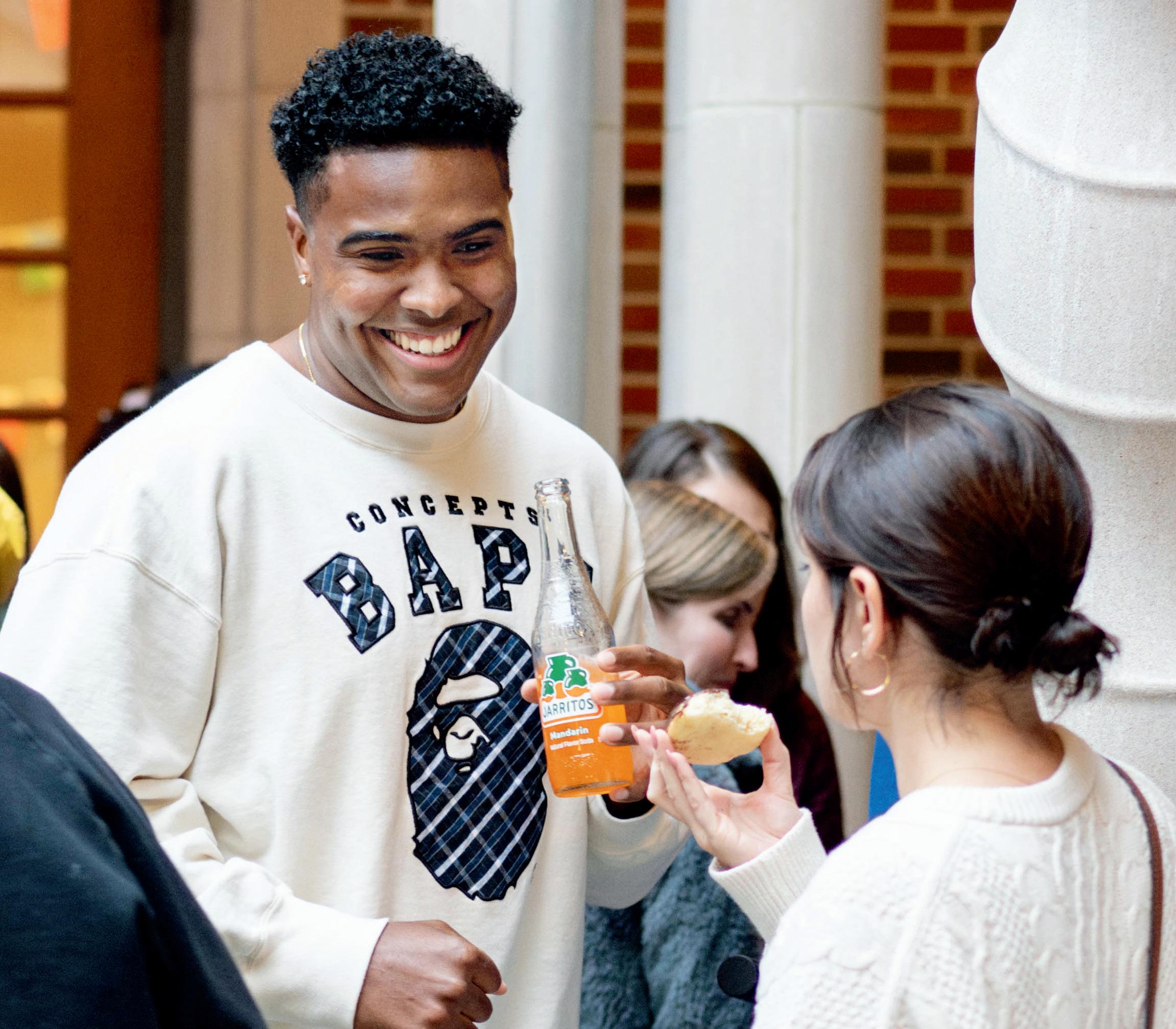
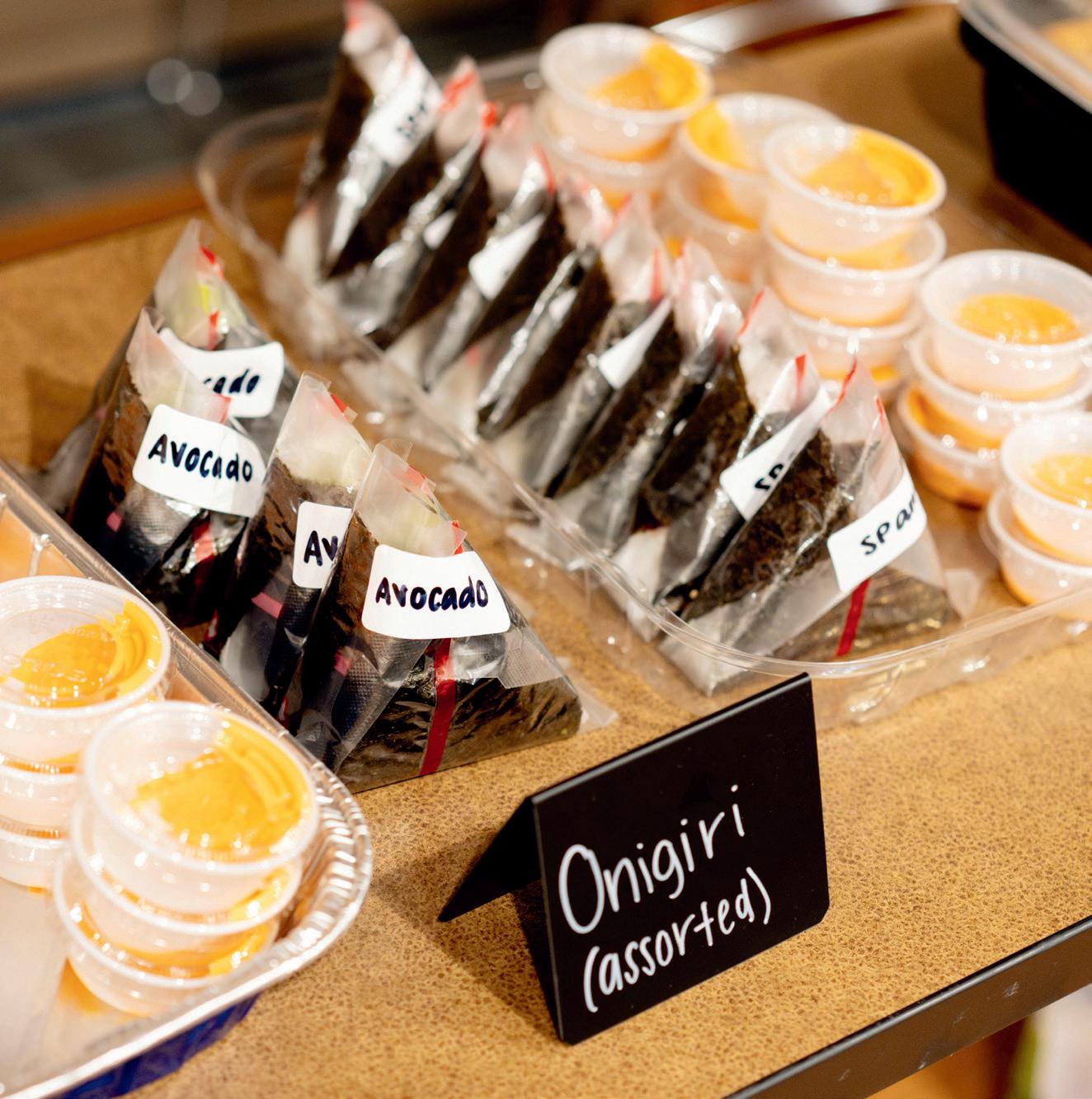
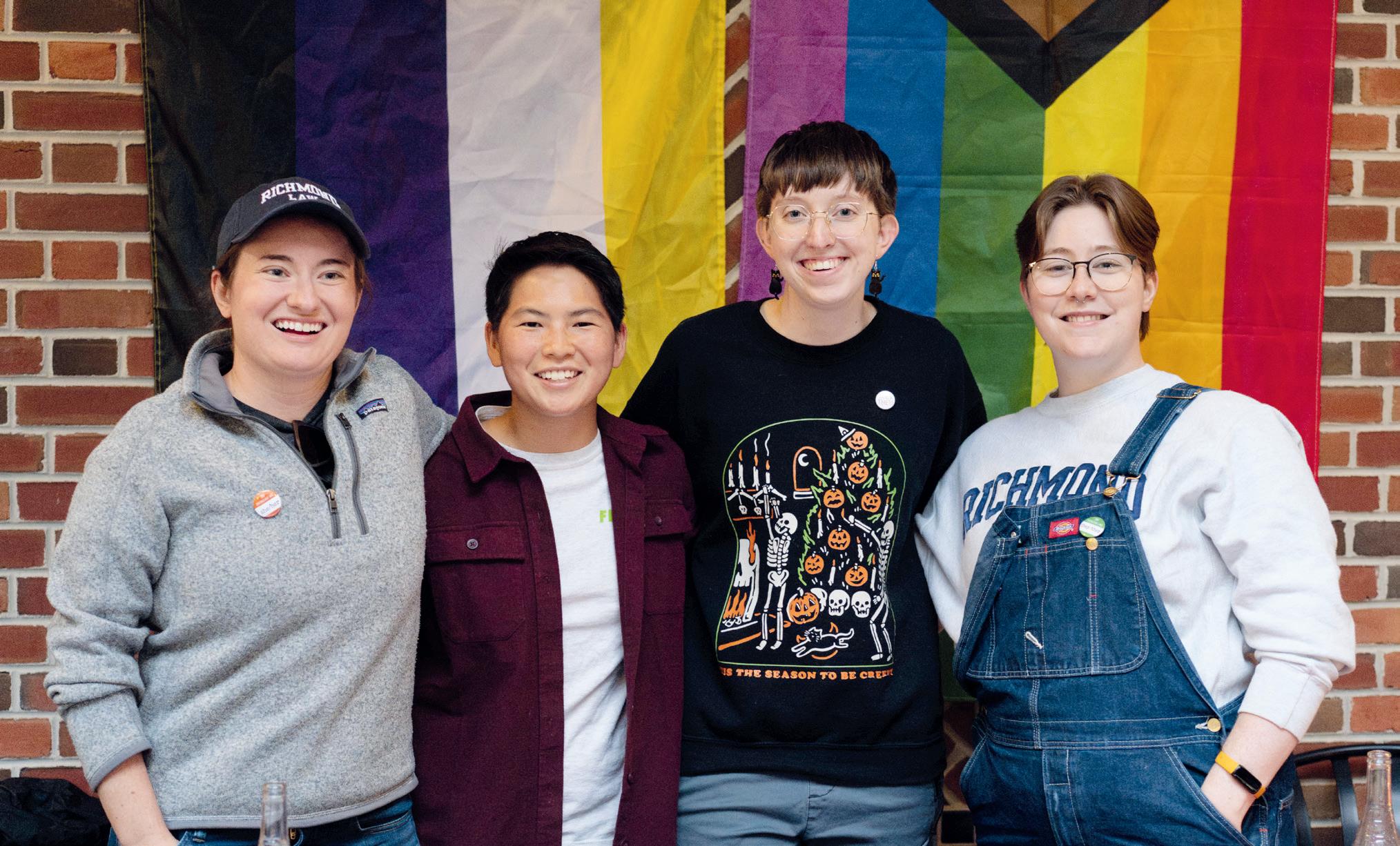
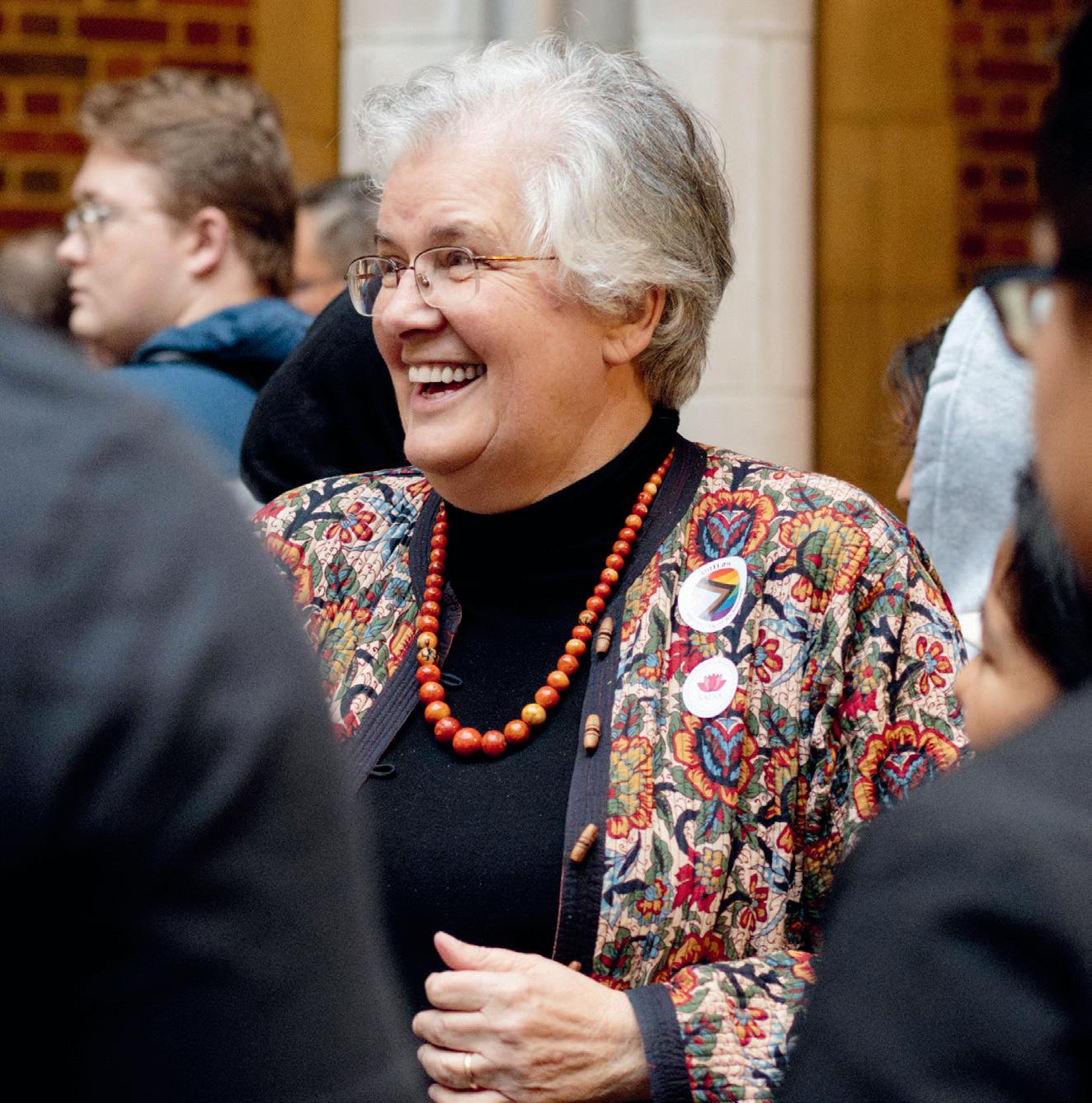
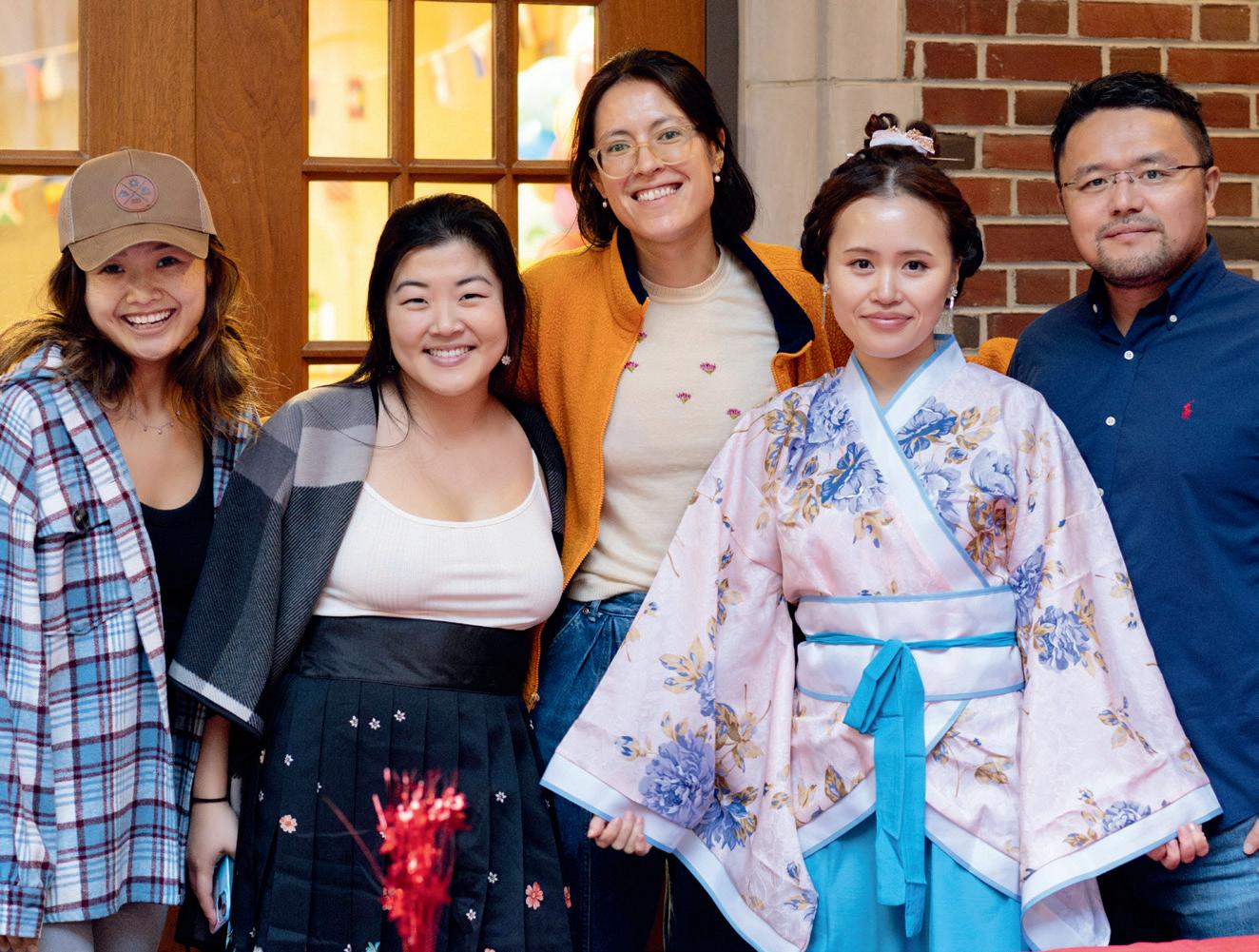
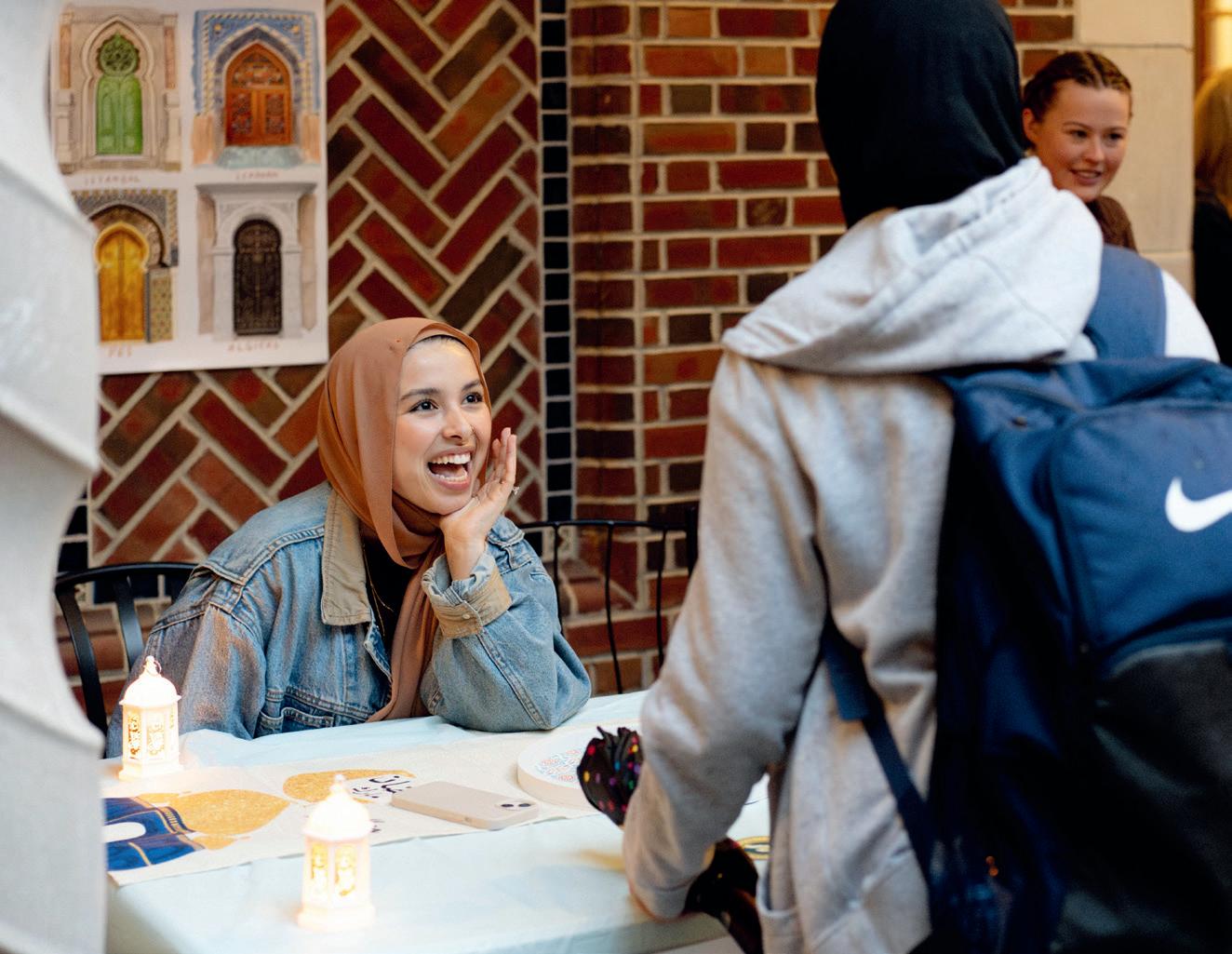

DEAN’S LETTER
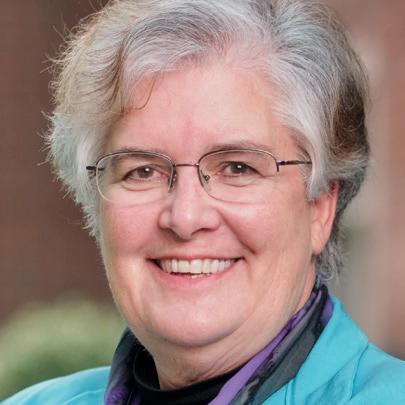
Dear friends,
Resilience. Innovation. Accountability.
These are the types of characteristics that we champion at Richmond Law as we train the next generation of lawyers. This issue of Richmond Law brings you stories that bear them out.
Courtney Paulk, L’00, is the first person in history to complete the Double Triple Crown of endurance swimming (learn what that means on Page 12). She’s also president of Hirschler and offers valuable insights into the power of breaking down monumental tasks into manageable steps — a practice applicable not only in the open waters, but also in our legal careers.
Addressing our planet’s climate crisis will require new, innovative ways of thinking, and you’ll hear from three Richmond Law professors who are doing just that. Through their research and advocacy, professors Danielle Stokes, Noah Sachs, and Joel Eisen exemplify the spirit of innovation and interdisciplinary collaboration that our society needs to mitigate the impacts of the environmental challenges we face.
Professor Chiara Giorgetti has emerged as a key figure in the global effort to address the ongoing war in Ukraine. Drawing on her expertise in international claims commissions, she is playing a pivotal role in establishing mechanisms for reparations and holding aggressors accountable, thereby exemplifying the complex intersection of legal scholarship and practical advocacy.
From the historic achievements of our alumni to the groundbreaking research and advocacy of our faculty, I hope these stories serve as a powerful reminder of the feats we can accomplish when we employ the skills necessary for success. And I hope they inspire you as they do me.
Best,
Wendy C. Perdue Dean and Professor of LawRichmond Law
DEAN
Wendy C. Perdue
DIRECTOR OF COMMUNICATIONS AND MARKETING
Renee Russell
ASSISTANT DEAN FOR DEVELOPMENT
Allie Carter
University Communications
SENIOR WRITER/ EDITOR
María Badillo
SENIOR EDITOR
Matthew Dewald
ASSOCIATE VICE PRESIDENT FOR CREATIVE AND DESIGN SERVICES
Samantha Tannich
DIRECTOR OF DESIGN SERVICES
Katie McBride
GRAPHIC DESIGNERS
Ashley Gladner
Gordon Schmidt
CONTACT
lawalumni@richmond.edu
804-289-8028 law.richmond.edu
CHANGE OF ADDRESS
800-480-4774, ext. 7 lawmagazine @richmond.edu
© 2024 University of Richmond School of Law.
This publication may not be reproduced in whole or in part without express permission from University Communications.
Richmond Law, of which this is Volume 36, Number 2, is produced by the Division of University Communications in partnership with Richmond Law. It is published biannually for alumni and friends of the University of Richmond School of Law, University of Richmond, VA 23173.
COVER Photograph by Jamie Betts
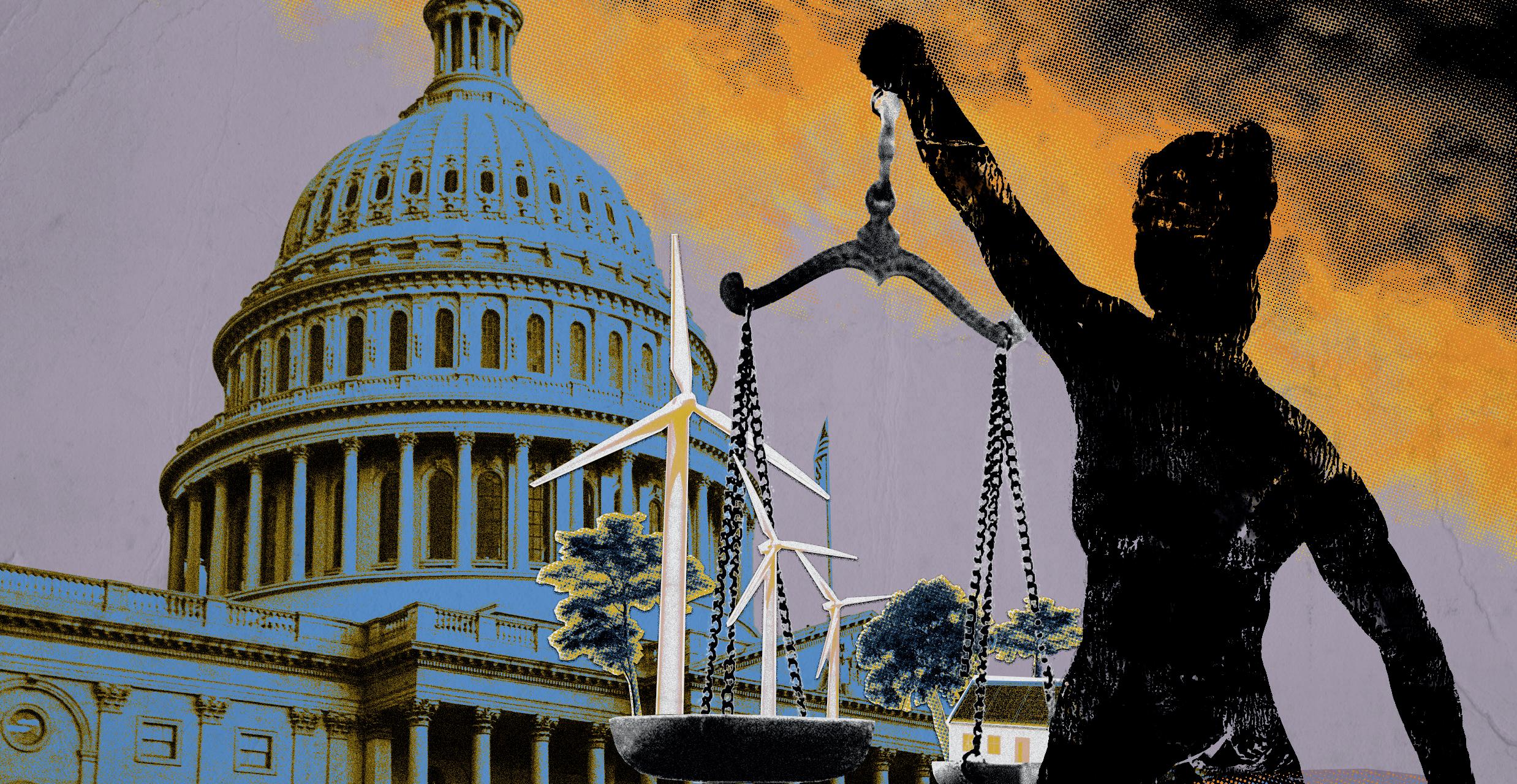
18
12
This alum’s legal prowess is bolstered by her skills as a master endurance swimmer.
18
Three professors analyze the global climate crisis, each conducting research intending to shape the future of climate regulations.
4 For the Record
Award-winning alumnus on protecting immigrant communities
Richmond Law staff first on campus to become Inclusive Partner-certified Kevin Woodson discusses race in elite workplaces
28 Faculty Notes
“I came here because the heart and community of Richmond called to me,” says Danielle Wingfield
24
Chiara Giorgetti is co-developing a mechanism to hold Russia accountable for violations of international law in Ukraine.
30 Class Notes
Tom Garrett, L’03 Vishwa Link, L’93

“Leaders in the Law” is Virginia Lawyers Weekly’s signature event, annually honoring lawyers who set the standard across the commonwealth.
“Up & Coming Lawyers” recognizes attorneys in their first 10 years of practice who have established themselves as leaders of the future.
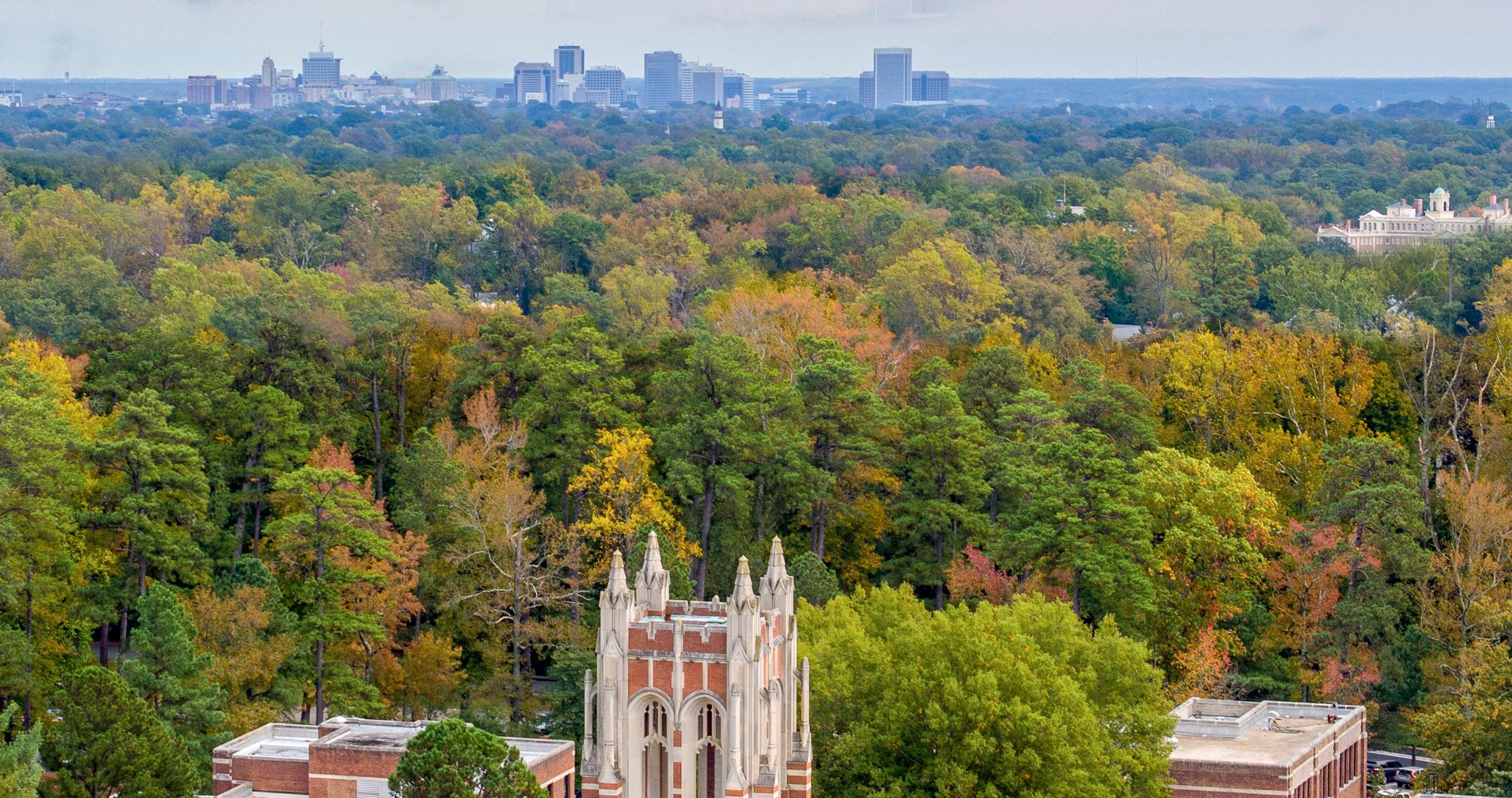
Richmond Law graduates are setting the standard for others in the legal profession. Of the 30 individuals named by Virginia Lawyers Weekly as Leaders in the Law, nine were Richmond Law alumni. No other school had more than three.
• Lauren Ellerman, L’04, Frith & Ellerman Law Firm, Roanoke
• Heather M. Fields, L’09, Nelson Mullins Riley & Scarborough, Richmond
• Jeffrey A. Hunn, L’00, Pender & Coward, Virginia Beach
• Benjamin D. Leigh, R’91 and L’96, Troxell Leigh, Leesburg
• Harris W. Leiner, L’01, Barnes & Diehl, Richmond
• Isaac A. McBeth, L’11, Halperin Law Center, Richmond
• Shari Skipper, L’05, Hanover County Commonwealth Attorney’s Office
• Henry “Harry” N. Ware Jr., L’83, Spotts Fain, Richmond
• Carolyn A. White, L’93, ThompsonMcMullan, Richmond
• P. Thomas DiStanislao, L’16, Butler Snow, Richmond
• Brooke Taylor, L’15, Reinhardt Harper Davis, Richmond
• Laurel E. Via, L’21, Barnes & Diehl, Richmond
• Amanda M. Weaver, L’14, Williams Mullen, Richmond
“ Winning this award reflects the passion that I have for the legal profession. It means that I have the respect of my peers. It also means that I have a continuing obligation to mentor the younger generation of attorneys. I wouldn’t be where I am now without my Richmond Law education. The Richmond community is special. It opens doors. I made lifelong friends at the University of Richmond, many of whom I work on cases with today. My Richmond Law education was invaluable and made winning this award possible.”
— Jeffrey A. Hunn, L’00
“ There are a lot of good people around the commonwealth trying to make lives for everyday Virginians better — a lot of these folks went to Richmond [Law]. I consider myself lucky when I drop in for a guest lecture from time to time and keep up with some of the great professors like Wade Berryhill and Hamilton Bryson.”
— Benjamin D. Leigh, L’96
“ This recognition spoke to the reason I focused my practice on estate and elder law. The ceremony was held on the 30th anniversary of my father’s suicide. In managing the financial and emotional aftereffects of his death and that of my maternal grandfather six months later, I saw these areas of law had tremendous impact on the survivors’ lives. I’m grateful for my peers’ appreciation of this vital work.”
— Carolyn A. White, L’93
On May 23, 1944 — 80 years ago — Tech. Sgt. Ernest Herbert Dervishian, L’38, found himself far ahead of his company near Cisterna, Italy. After spotting a German-held railroad embankment, Dervishian’s actions forced dozens of enemy soldiers to surrender through a series of bold maneuvers. For his bravery in combat, he was awarded the U.S. military’s highest decoration, the Medal of Honor.
Dervishian received a battlefield promotion to first lieutenant after the U.S. Army liberated Rome in June 1944. In January 1945, he received the Medal of Honor in a ceremony near the front lines in Northern Italy.
In 1945, he returned to a hero’s welcome in his hometown of Richmond. The city held a parade, closed the government and schools,
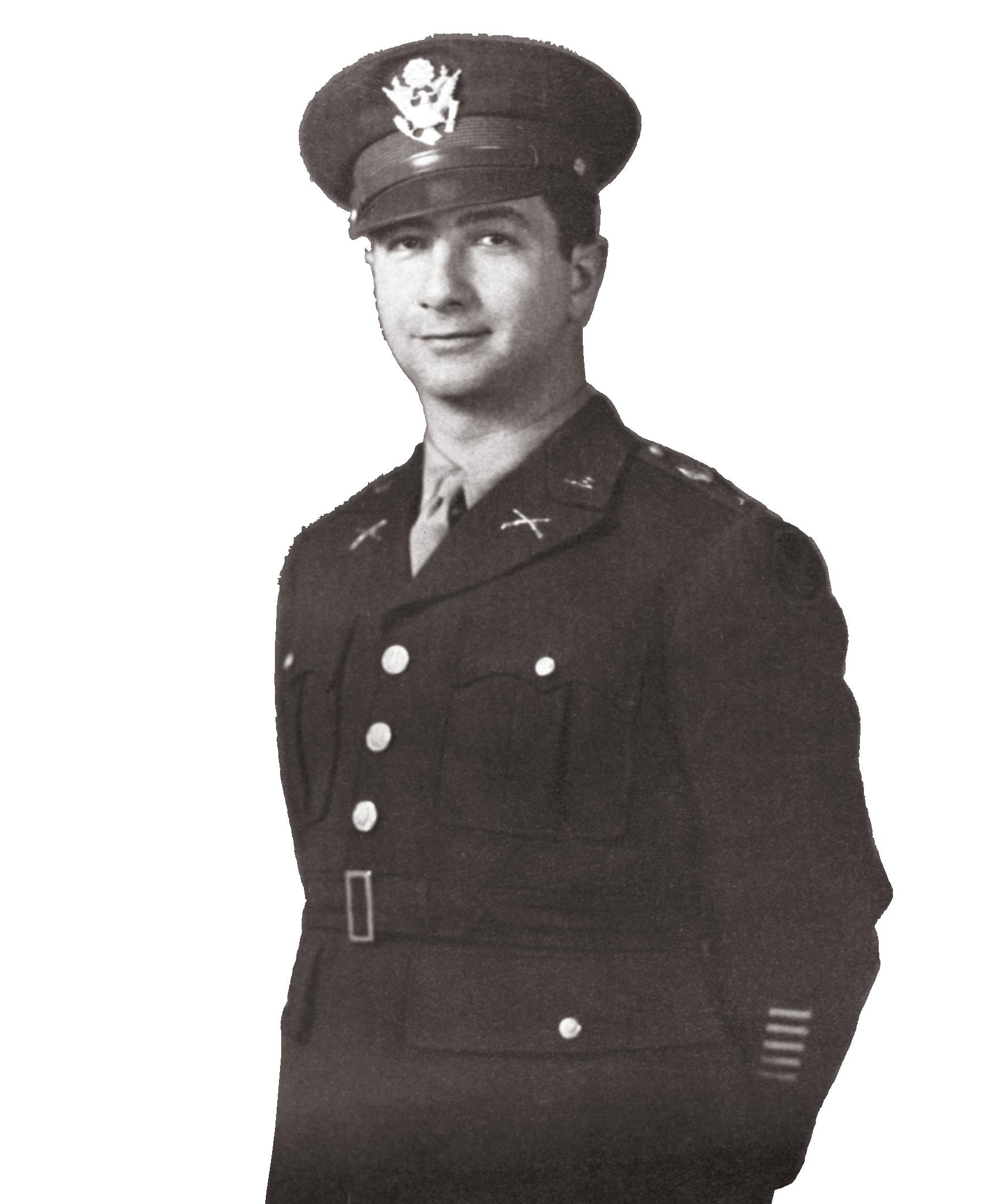
and honored him in a ceremony. During commencement ceremonies at the University of Richmond, Dervishian, then 28, was awarded the University’s Honor Plaque. A year later, he was invited back to the university to meet two of the former commanders of the Allied Forces, Gen. Dwight D. Eisenhower and Adm. Chester W. Nimitz, who addressed the campus at Cannon Memorial Chapel.
“God’s hand had been on my shoulder — I was lucky,” he said that day. “My thoughts and your thoughts go out to those who have been killed, those have been wounded, those who are missing, those who are prisoners of war. They are all due equal credit, if credit is to be bestowed for doing one’s duty. Countless others performed acts equal to mine. They were not so lucky.”
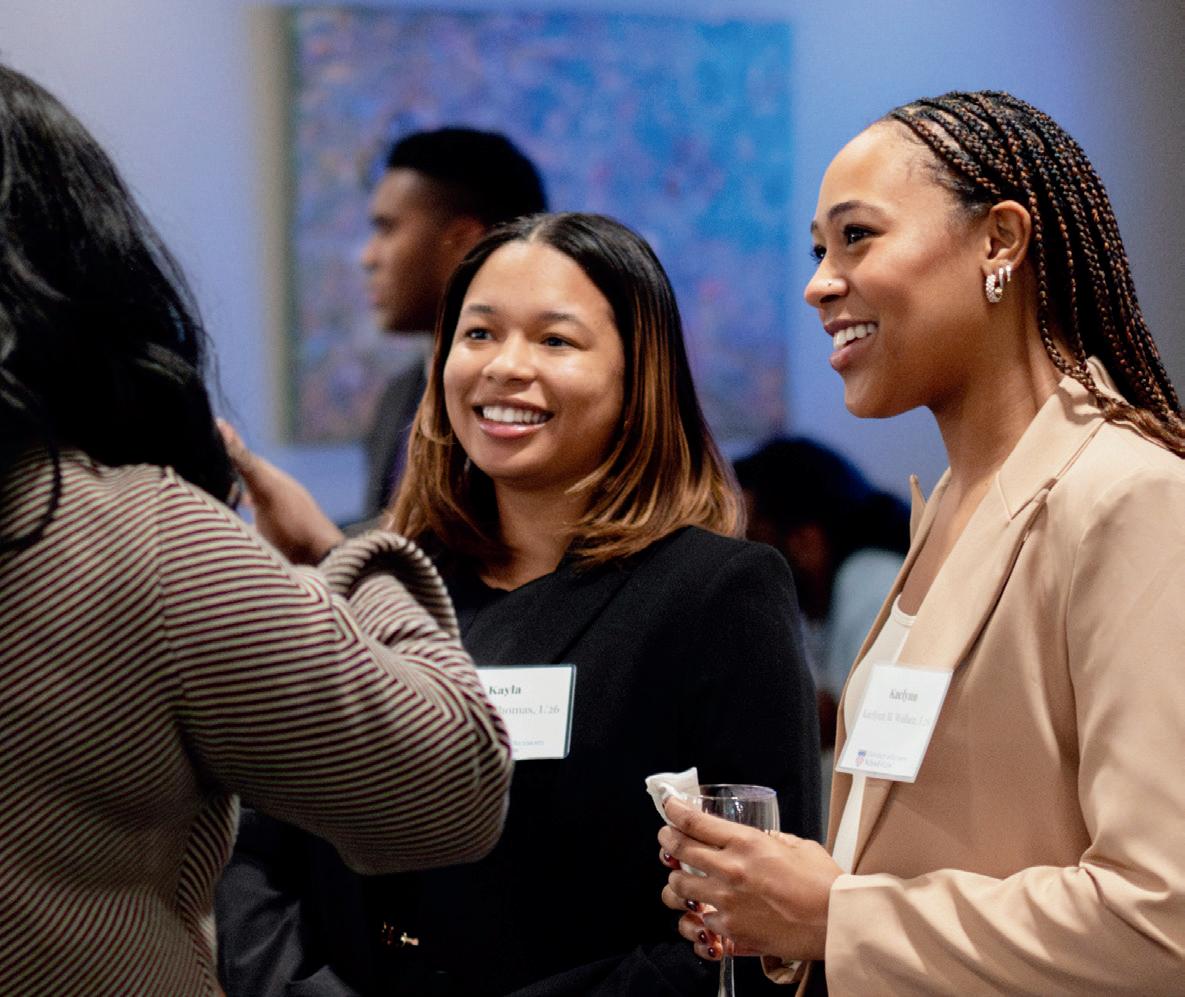
The Black Law Alumni Association gathered to celebrate its first anniversary as part of the Richmond Law community. This photo was taken at the second annual reception hosted on campus in February 2024. To learn more, visit law.richmond.edu/ alumni.
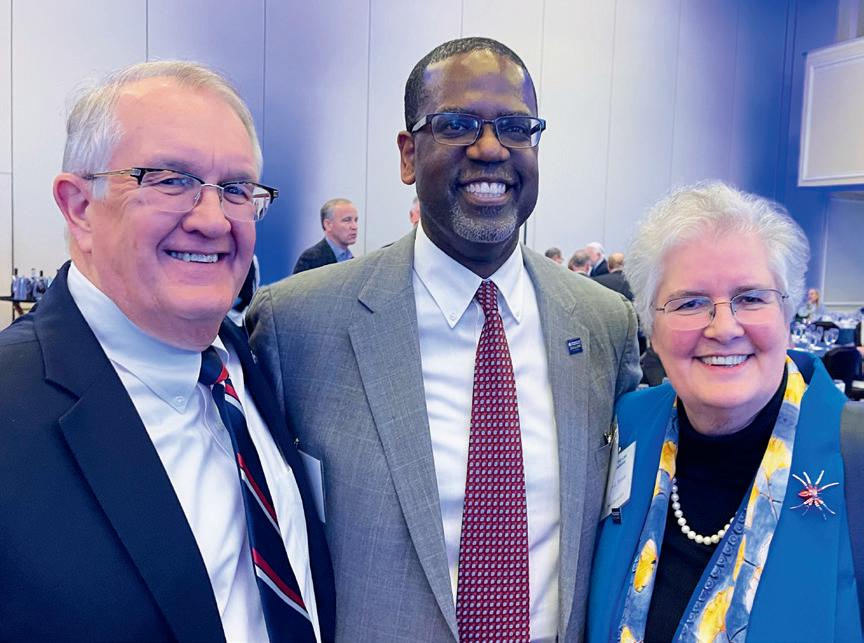
Professors Clark Williams and Hank Chambers and Dean Wendy Perdue (above) were inducted into the Virginia Law Foundation Fellows Class of 2024.
Virginia Law Foundation Fellows are recognized for leadership across the commonwealth through nominations submitted confidentially by their peers.
In the words of the Virginia Law Foundation, “The Class of 2024 joins more than 750 recognized legal practitioners in Virginia who are committed to the highest ideals of the law and exemplify the concept of citizen lawyer.”
Dozens of legal scholars met at the annual Junior Faculty Forum. The workshop, offered each year at the start of the summer, brings together junior law professors from across the country to present their scholarship in an informal, collegial atmosphere.
“Conferences like this are important because they provide a welcoming and constructive environment where junior faculty can hear from peers and receive supportive feedback at any stage of a project,” said Allison Tait, associate dean for faculty development at Richmond Law.
“There are not many other opportunities like this, and it fills a real need for law faculty who are in the early part of their career,” she said. “We love the energy of the group [as] participants find new friends, make new connections, and get to know a cohort of people who can then serve as resources as they work toward tenure.”
IN THE NEWS
When media outlets cover news and events, they come to Richmond Law for expertise and perspective. Here’s a sample of recent stories that feature experts from Richmond Law.

In a report titled “Belief death penalty is applied unfairly shows capital punishment’s growing isolation in US,” lethal injection scholar CORINNA LAIN contributed, “The number of states that don’t have the death penalty could easily rise to 40. But a nationwide ban would need action from the U.S. Supreme Court.” The article was picked up by more than 400 media outlets.
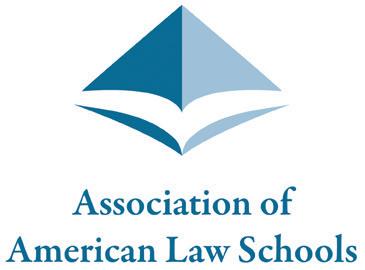
Dean WENDY PERDUE was quoted in “Member School Highlight,” saying, “Our goal at Richmond Law is to prepare students to flourish in all aspects of their professional lives. That means equipping our students with the core knowledge that every lawyer needs, while instilling an innovative mindset to help each individual achieve their highest potential.”

Cyber law expert ANNE
TOOMEY MCKENNA penned “The FTC’s case against adtech giant Kochava highlights how much data brokers know about us,” writing, “Most data privacy regulations in the U.S. were conceived in the pre-generative AI era, and there is no overarching federal law that addresses AI-driven data processing.”

JOEL EISEN , energy law expert, was quoted in “Energy cases to watch in 2024.” Eisen noted several key cases, including Chevron, which directs courts to defer to agencies’ interpretations of ambiguous statutes as long as judges find that their reading of the law is reasonable. “A Supreme Court ruling nixing Chevron would mean an end to a thumb on the scale for agency reasonableness. Agencies like FERC could not expect that their conclusions about what statutes mean would be routinely upheld.”
Fun. Charismatic. Intelligent. These are just a few words Robert Colley, R’68, uses to describe his friend Gerald Thomas Massie, R’68 and L’76, affectionately known as “Tom” to those close to him.
“Tom was quite a character,” Colley said, recounting stories of Massie teasing buddies and giving bear hugs. “He was a good student, had plenty of interests, and he had a nickname for everybody. He usually had some kind of a smirk on his face, which meant either he’d done something outrageous or he was going to.”
After completing his studies, Massie entered the Army, where he became a sergeant and served as a platoon leader in the infantry during the Vietnam War. He was awarded the Purple Heart and the Bronze Star Medal with the “V” device and third oak leaf cluster — honoring his valor and heroism.
HONOREE
Following his military service, Massie returned to Richmond for law school and ultimately became president of the Piedmont Bar Association. At the time of his passing in 1993, he was serving as a Goochland Assistant Commonwealth’s Attorney. With deep admiration for his friend’s leadership, bravery, and allaround zest for life, this year, Colley established the Gerald Thomas Massie Scholarship. It will support veterans who are pursuing legal education at Richmond Law.
This scholarship is not only a financial support system for students pursuing legal education, but a living tribute to a man whose life was a celebration of friendship, bravery, and the joy of living each moment to the fullest. Contributions to this scholarship will carry forward this legacy, ensuring that Massie’s impact endures for generations to come.

In January, Virginia Lawyers Weekly published its 2024 list “Influential Women in Law,” this year adding its inaugural Circle of Excellence award to the program. Stephanie Grana, W’90 and L’93 (above, left), was on the list of honorees.
In the words of Virginia Lawyers
Weekly, “Our inaugural Circle of Excellence honorees are former Influential Women who are being honored for their sustained level of achievement and record of leadership.”
The honorees were celebrated on Feb. 27 at the John Marshall Ballroom in Richmond.
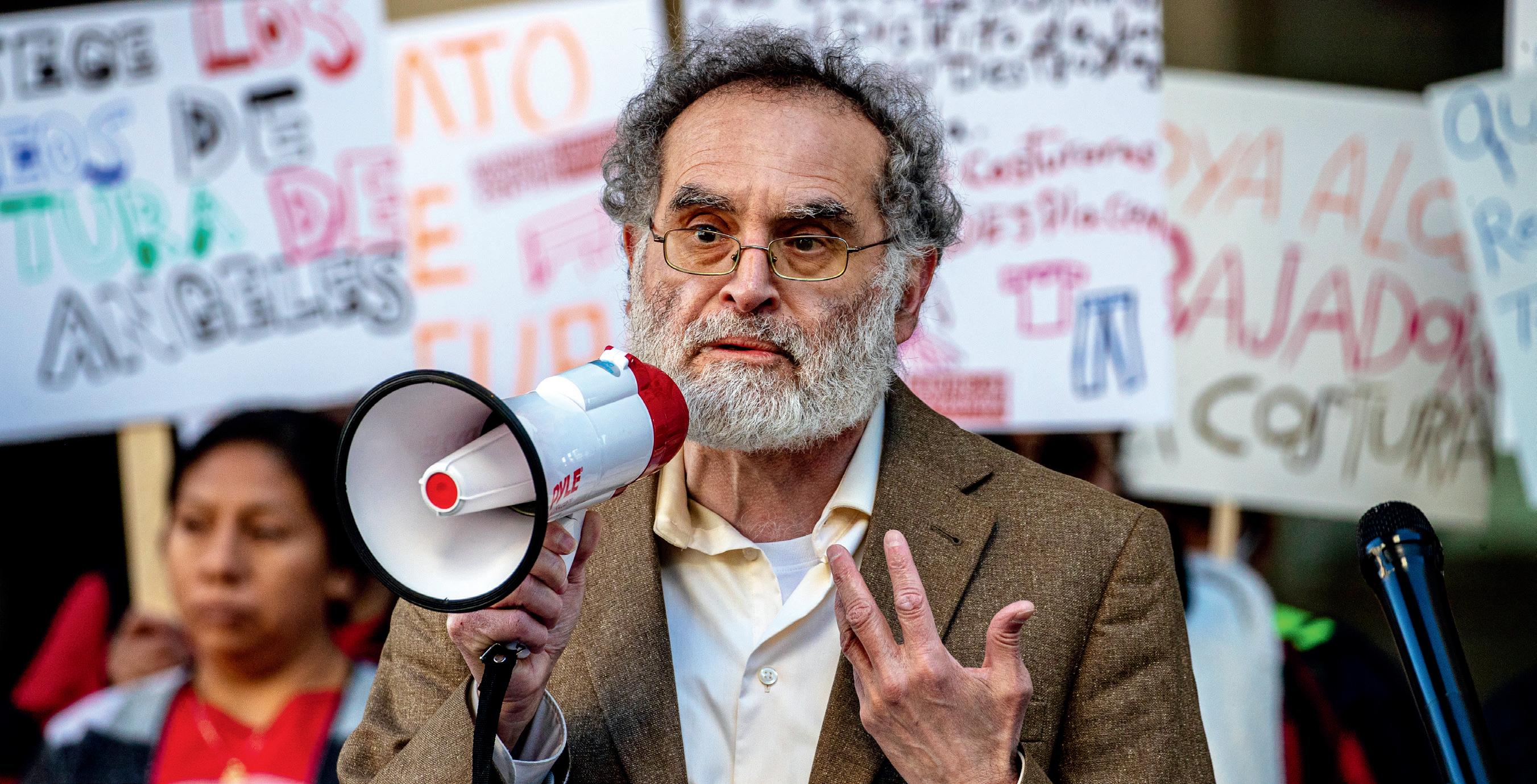
Q&A In 2023, UCLA law professor Victor Narro, L’91, received the Mexican American Legal Defense and Education Fund (MALDEF) award for community service. Here, he reflects on the importance of protecting immigrant communities in the U.S.
WHAT ARE YOUR THOUGHTS ON RECEIVING THE MALDEF AWARD?
When I graduated in 1991, I wouldn’t have predicted that over 30 years later I would be teaching at UCLA and receiving an award like this. I have learned the importance of taking people with you — teachers, colleagues, and friends — and always keeping doors open. There are so many opportunities to make beautiful connections. [The Victor Humberto Narro Scholarship at VCU] provides support to undocumented students or students enrolled in the Deferred Action for Childhood Arrivals (DACA) program, creating pathways for advocacy in and on behalf of immigrant communities.
HOW CAN THE RIGHTS OF ASYLUM SEEKERS BE PROTECTED DURING THESE LONG PERIODS OF POLITICAL NEGOTIATION?
Migrant families have become the target of political debate and are
subject to polarization. However, we have to keep their protections in focus. They have civil rights protection and work protections even if they make it into the United States undocumented. For a family to leave a country, they leave because of fear of political prosecution, war, and economically cannot provide for themselves. So we have to put aside the politics, put aside the ideology, and afford them their rights whether they are employed or just trying to survive. They are human beings.
WHAT PHILOSOPHIES ARE YOU TEACHING AS A UCLA LAW PROFESSOR?
Many of my students are first-generation and/or undocumented. I [aim to be] open-minded — they want to do good work. Having been through a lot of injustices, they come with that anger and that passion, but I tell them to channel it in a way that allows them to fight hard for their cause,
never at the expense of someone else. I was a first-generation student myself; I fought the same sentiments. Even though the law is adversarial by nature, you should always address the issue, not the individual. Nothing good comes out of anger; we must come to a space of dialogue.
TELL US ABOUT YOUR BOOK THE ACTIVIST SPIRIT: TOWARD A RADICAL SOLIDARITY. I used to be a very burnt-out person working 70 to 80 hours a week. So about 15 years ago, I shifted. I wanted to live a good life, not die young because I worked myself to the ground. I started picking up spiritual practices, mindfulness, and meditation, modeled after the teachings of St. Francis of Assisi. Focusing on empathy, equality, and compassion helped to make the work more sustainable. I wrote The Activist Spirit using these lessons and my experience with them. What is a bad day, really, if you are living your purpose? That is what I tell the people I work with — you cannot control the outcomes; just do your best.
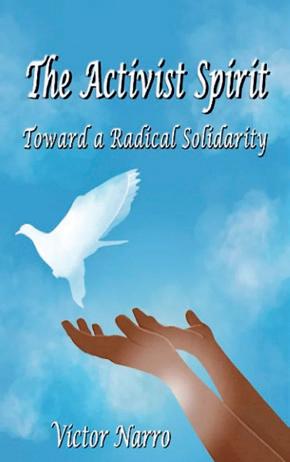
« THE ACTIVIST SPIRIT
In his book, Narro suggests that within social justice activism, there is a spiritual core through which individuals can deepen their solidarity with one another.
Najeeba Syeed, visiting professor at Starr King School for the Ministry, describes the book as “an interfaith, intercultural, transnational journey that will refresh your soul [and] bring joy back to your weary body.”
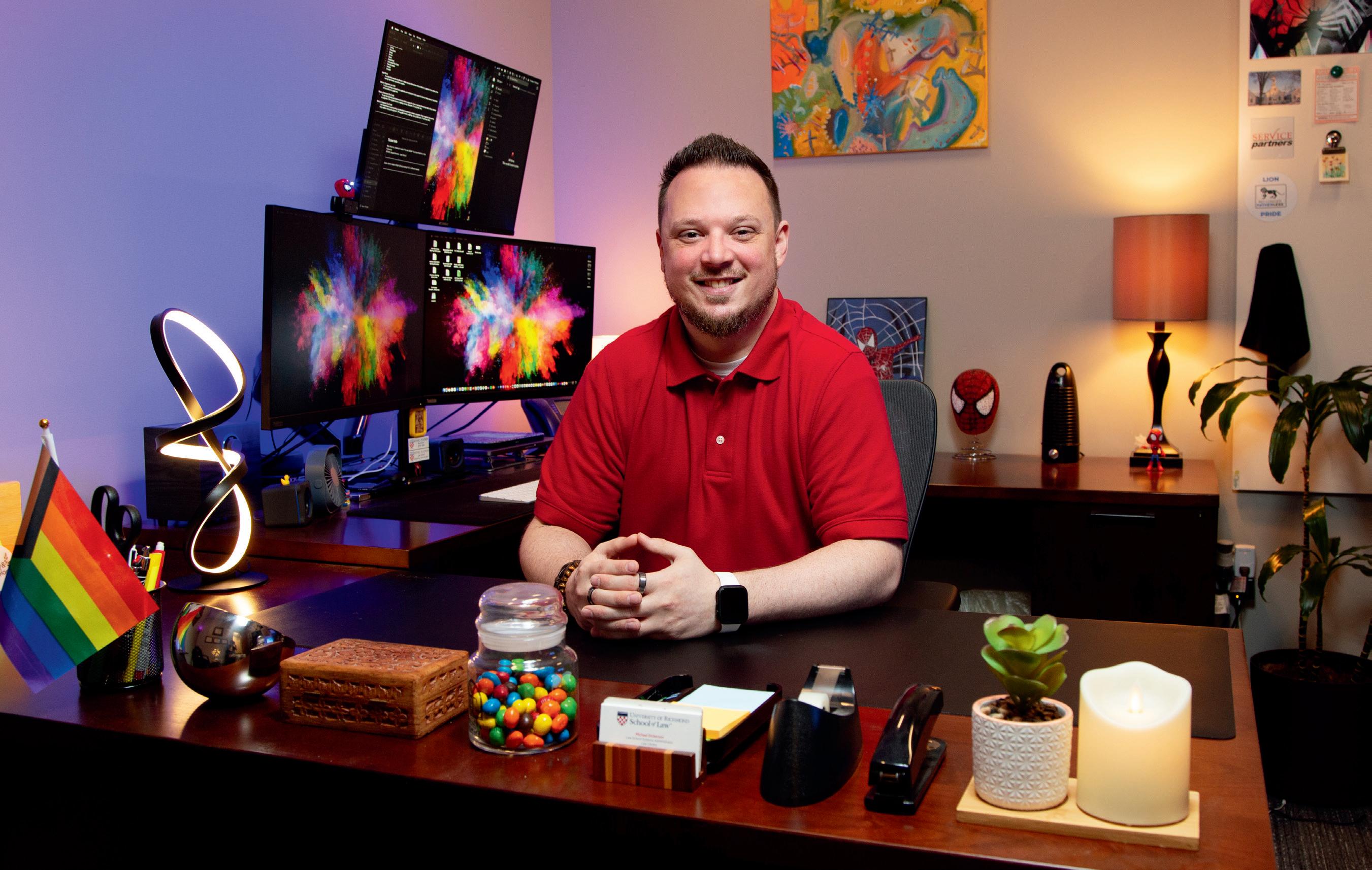
In the low light of his first-floor office, Michael Dickerson, C’14, made a decision. Dickerson, the law school’s IT systems administrator, spoke with a stranger who would share his story in this magazine. His story illustrates well the dedication Richmond Law has to diversity, equity, inclusion, and belonging.
Dickerson decided to be vulnerable, a virtue that also supported his journey to becoming the first certified Inclusive Partner on campus.
The Inclusive Partner Certificate Program is a series of workshops for UR students, staff, and faculty that builds a toolkit of inclusive practices to support identity-based communities. Race, religion, and socio-economic status are among the topics discussed. One workshop, Affirming Space, teaches how to foster inclusive environments for LGBTQ+ people and was previously known as Safe Zone.
“I’m telling you this because I feel safe with you,” Dickerson began.
He then pointed to his office door and its line of badges representing the stages of his Inclusive Partner training and similar campus participation. “See all those? There’s an Easter egg in there of sobriety,” Dickerson said, referencing the Peer Recovery Specialist and Recovery Ally
stickers. “It’s an easy way for me to tell my truth without standing on the corner with a bullhorn.”
The more support Dickerson experienced on campus, the more he wanted to carry that compassion to the law school community. “All these opportunities where I could share myself helped me break down my own walls. In turn, maybe they can help build someone else up. [This certification] is a starting point of letting people know they’re not alone. [My office] is a safe place to have a simple conversation, and sometimes that’s all people need to get them thinking differently.”
Dickerson’s windowless workspace is intentionally decorated with warm lighting and Spider-Man memorabilia on display. In a word, it feels safe. “It’s an extension of my personality and lets people’s guards down when they walk in. Especially because I’m not in the hierarchy. I’m not faculty. I’m not part of the dean’s office. I’m an IT professional. And for some, that’s more approachable.
“Not all [the Inclusive Partner workshops] are directly part of my life, but they’re part of somebody’s life. And if I’m more informed, it makes me a better-rounded employee and a better-rounded advocate.”
by Gordon
Tax season can be stressful. But professor and resident tax expert Hayes Holderness offers a fresh perspective on this necessary part of society.
According to Holderness, there are three major touchpoints where U.S. citizens influence their government: voting, jury duty, and taxes.
“People don’t think of paying taxes as that opportunity,” Holderness says. “But it is. When we see what is taxed, we see what the government values. Then it becomes a chance for us to tell our legislators if we agree.”
To people who want to gain a better understanding of the tax system, Holderness recommends the book
Taxing Ourselves: A Citizen’s Guide to the Debate over Taxes. “It explains the social policy choices inherent in the tax code, which express how we think people should bear the burden of society. This book explains the tradeoffs,” what we gain as taxed citizens in exchange for part of our income.
We’re fresh out of tax season, but Holderness encourages people to look beyond tax day.
“Justice Oliver Wendell Holmes has a great quote: ‘Taxes are what we pay for civilized society.’ It’s important to think about taxes as more than a financial burden. Recognize the benefits they pay for.”
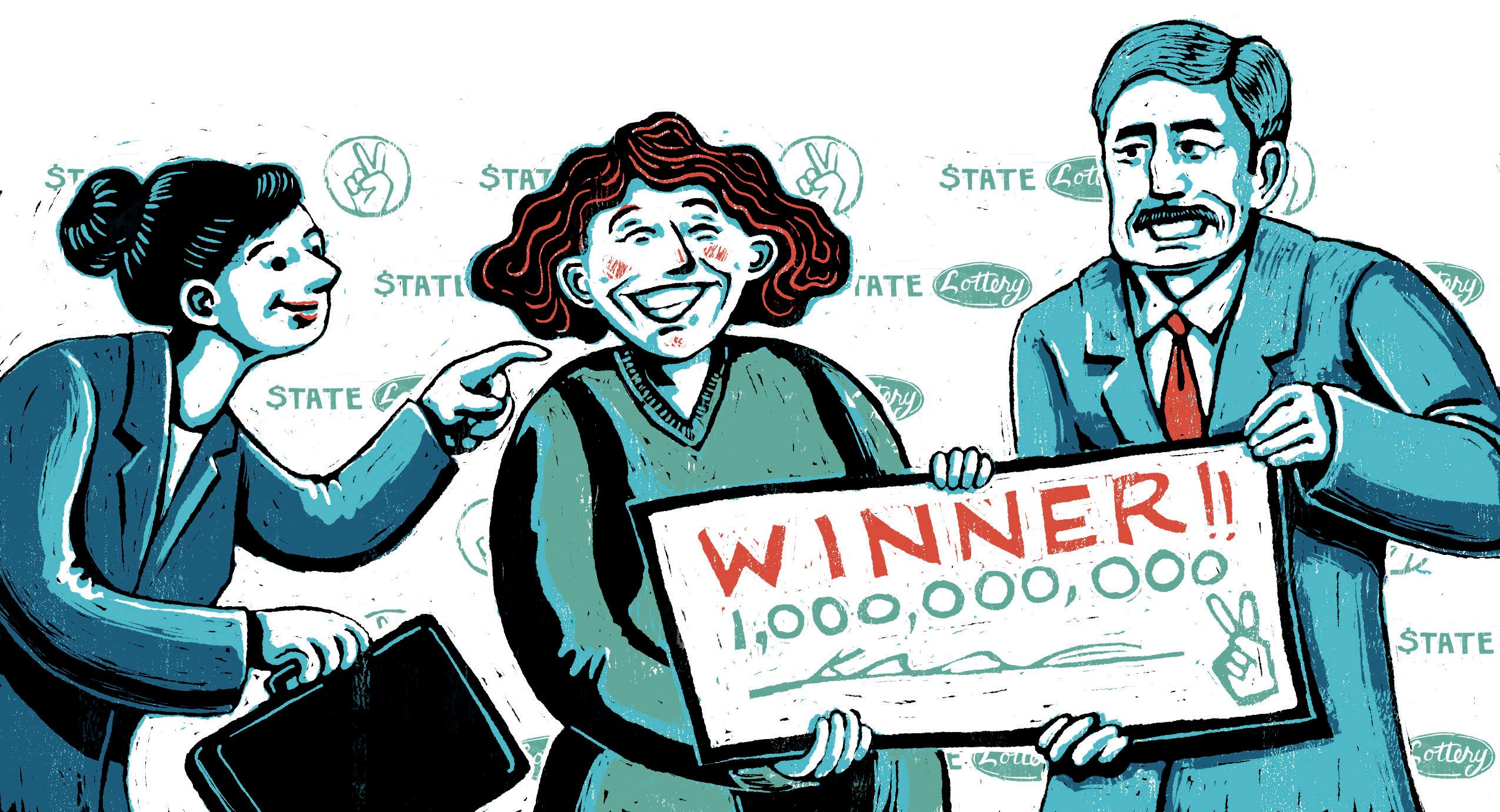
Everyone imagines what they would do if they won the lottery — trips to take, cars to buy, jobs to quit. However, the first thing any new lottery winner should do is call their lawyer. This was the advice shared at a recent Law Over Lunch program hosted by the Carrico Center for Pro Bono & Public Service.
Carolyn White, L’93, managing attorney at Midlothian Estate and Elder Law, and Frances Goldman, owner of The Tax Complex, led attendees through an entertaining and informative discussion about why legal planning should be at the
top of the to-do list for anyone who experiences a windfall.
“Although the lottery may be the windfall that receives the most attention, attorneys need to advise their clients on how best to prepare for other more common types of windfalls such as inheritances or litigation settlements,” said Tara Casey, professor and director of the Carrico Center.
According to Casey, the key to fully enjoying a windfall lies in making the right decisions early in the process. “Those early decisions may make the difference between financial security and debt anxiety,” she said.
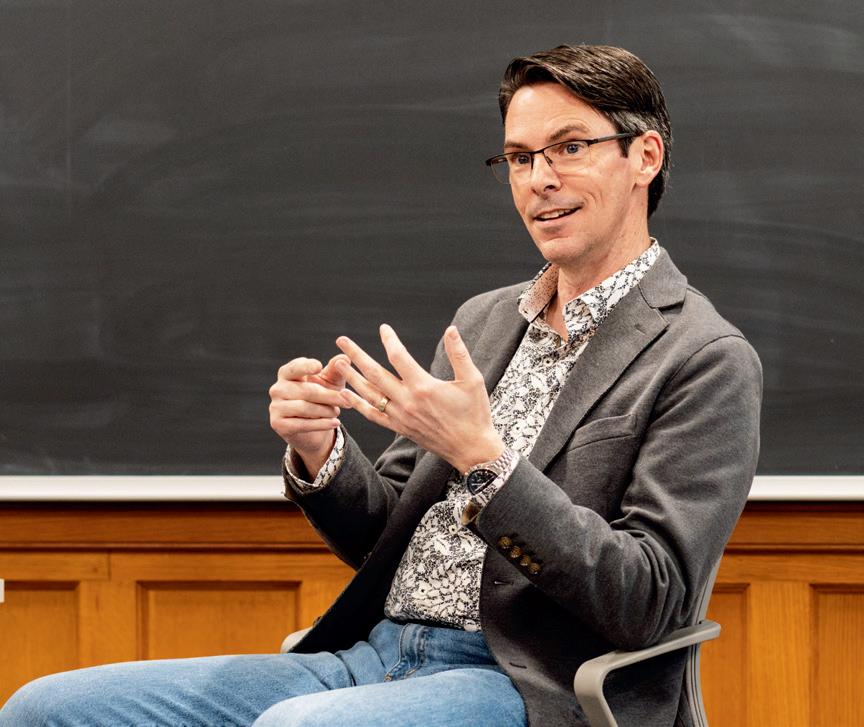
In January, Richmond Law held its 30th annual Journal of Law and Technology Symposium. JOLT was the nation’s first exclusively virtual law review and was co-founded by Rick Klau, L’96, pictured above.
This year’s theme was “A 30-Year Perspective of Legal Innovation in the Digital Age.” The symposium examined emerging AI technologies such as ChatGPT and automated decision making systems, along with the opportunities and risks for stakeholders in the world of space law, privacy law, commercial law, and others.
Equal access to education took center stage at the recent annual symposium hosted by the Richmond Public Interest Law Review
The event, titled “Not Just for Learning: A Comprehensive Look at How IEPs and 504 Plans Affect Youth,” delved into the educational experiences of students with disabilities and explored how individual education plans can improve these experiences.
“Assuring educational equality for all students is part of who we need to be as a country,” said Dean Wendy Perdue. “All of our young people have enormous potential, but we have to put in place the necessary measures to help them realize that potential. It’s not always easy, and sometimes it requires the intervention of experts to ensure a smooth educational journey.”
The symposium guided attendees through the structure of IEPs and 504 plans, how to get them, how lawyers can advocate for youths with disabilities, how IEPs can be applied to adult cases, and how to address issues when things do not go as planned.

Richard Campbell, L’93, recently published Gettin’ Kinda Itchie: The Groups That Made the Mamas & the Papas. This book traces the stories of the pre-groups of The Mamas & the Papas from 1958 to 1965, before they hit it big — a tale with an unexpected tie to the University of Richmond.
“About the same time I was discovering The Mamas & the Papas, a friend introduced me to a record by The Journeymen,” says Campbell. The Journeymen was the folk group of John Phillips, who would go on to lead The Mamas & the Papas. The Journeymen played at the University of Richmond in 1962 and 1963.
“Campbell meticulously puts together the puzzle of how The Mamas & the Papas were made, and he gets it exactly right,” says Michelle Phillips, an original member of The Mamas & the Papas.

In March, law professor Andy Spalding was a visiting scholar at Sciences Po Law School in Paris. He taught a research seminar on corruption, human rights, and the 2024 Paris Summer Olympics.
Spalding’s research focuses on human rights and anticorruption reforms in megasports, specifically related to the Olympic Games and the FIFA World Cups.
TECHNIQUE
Adjunct professor Alicia Penn approaches her legal writing as a journey. “There should be stopping posts, clear headings, a road map to where we’re going,” she says. Penn weaves this methodology into her “Writing for Clerks” course.
She offered her top tips for law students who are interested in clerkships — tips that happen to be helpful reminders for any lawyers looking to brush up on their writing skills, too.
1. Know your audience. How you write a brief versus how you write a bench memo are very different tones, and it’s because of the audience.
2. Structure is your friend. We have a tendency to want to sound very smart. That leads to long paragraphs, clunky sentences, and a lot of legalese. My philosophy is that a person who doesn’t know anything about a case should be able to pick up your piece and understand it.
3. No rules are set in stone. There are a lot of legal writers who will say don’t use contractions, don’t start a sentence with “and” or “but,” or don’t use semicolons. But you have to figure out your audience and what’s going to best help them understand the import of what you’re saying.
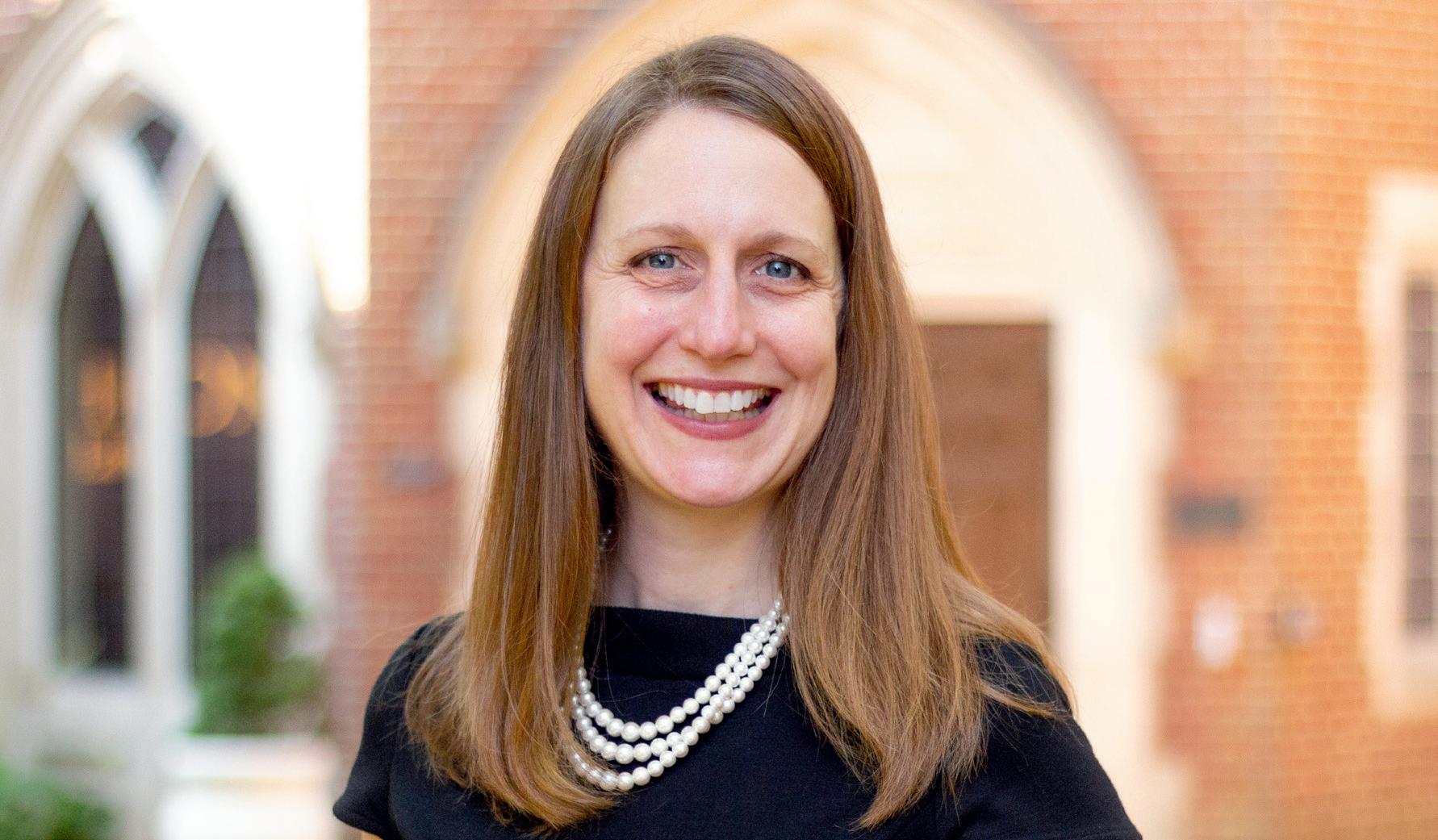
Anne Wroniewicz, ’06, a member of Richmond Law’s administrative staff and 2024 recipient of UR’s Outstanding Service Award, was named an Unsung Legal Hero by Virginia Lawyers Weekly
“I was so honored — but also humbled — to be nominated,” said Wroniewicz. “I have such profound respect for the clinical directors I support and the work they do for
their clients and community. I have seen the lengths they go to ensure that their clients, who otherwise might not have had legal representation, have access to zealous counsel and support.
“Moreover, they are amazing educators, teaching and leading the next generation of attorneys, and I am so proud to be a part of that.”
IN BRIEF Professor Kevin Woodson appeared on the national talk radio program Think in January 2024. The episode was titled “The plight of Black professionals in a white collar world.” Here’s a lightly edited excerpt of Woodson’s remarks.
Racial discomfort refers to the general unease that many Black professionals experience when working in predominantly white work settings. It can affect them in conjunction with racial bias, but it can also undermine their careers in the absence of racial bias.
In my book The Black Ceiling: How Race Still Matters in the Elite Workplace, I focus on two types of racial discomfort. There’s stigma anxiety, the discomfort people experience due to their concerns about possibly being discriminated against in the future. And there’s social alienation,
the unease that comes when they feel isolated and marginalized because their interests and background are very different than those of their colleagues.
These disadvantages are so impactful for Black professionals because relationships with your colleagues are incredibly important at elite firms. They determine your access to certain types of high-quality opportunities and whether anyone’s going to bat for you when it comes time for promotions or allocating bonuses. They also shape access to the advice and guidance that can determine whether you’re able to perform well on your assignments.
There is an incredibly important distinction between developmental work assignments and what you might consider grudge work or paperwork. The developmental work allows people to develop career capital, which includes bigger bonuses, relationships with the right senior colleagues
and clients, and reputational capital. So it’s important that as a junior professional you get as much of this work as possible.
When you receive those premium assignments and you do a good job on them, you’ve actually become more qualified than your peers for future assignments. So at that point, it becomes rational for a senior professional to say, “I want this person on my case.” There are people who leave these firms voluntarily to try to get a fresh start somewhere else where they think they’ll have better access to those opportunities.
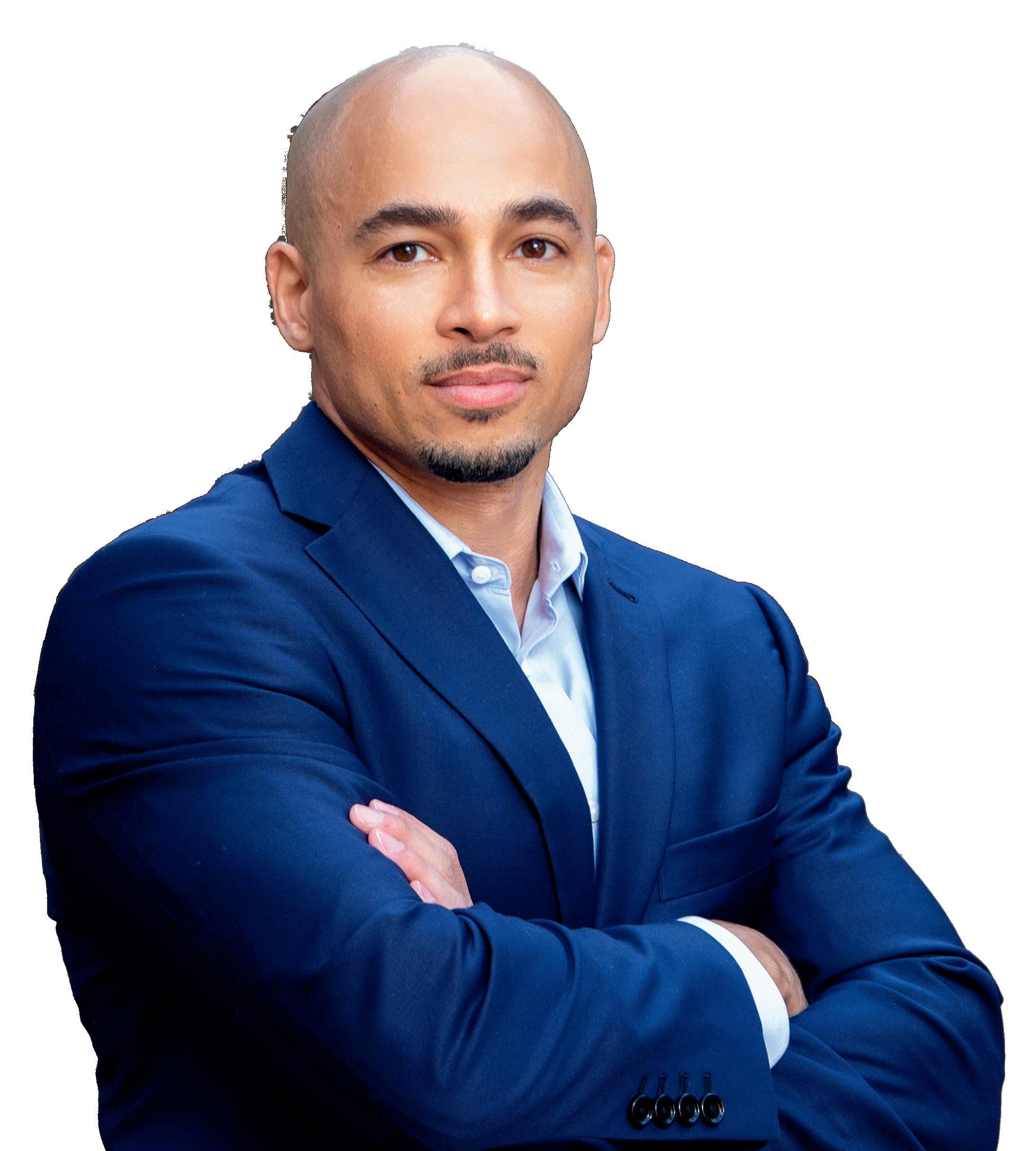
Not receiving those opportunities can undermine your self-confidence. It can lead to frustration, stress, and anxiety. It can affect people in ways that are not obvious to people who haven’t experienced it themselves.
There are a number of approaches that firms can take that would at least offer marginal progress. They need to adjust their training practices to raise awareness about some of these subtle issues. It’s easy to misinterpret racial discomfort as something else. And in this legal climate where race-based policies are under increased scrutiny, I think that some initiative has to come from individual senior professionals. There need to be people reaching out to their junior Black colleagues to make sure they’re not falling through the cracks, that they’re getting the opportunities and support that they need to thrive. It’s important they address perceived discrimination, as [it] can have a broad effect on Black professionals because the word spreads. Firms can also be more conscientious about where they hold work events and activities. These are all things that firms can do better.

« RESPONSES TO THE BLACK CEILING
“I [heard] from a man who had been working for 30 years and didn’t quite have the terminology to explain what it was that was bothering him about his firm,” said Woodson. “He felt that [my] book really spoke to his experience. He felt seen.”
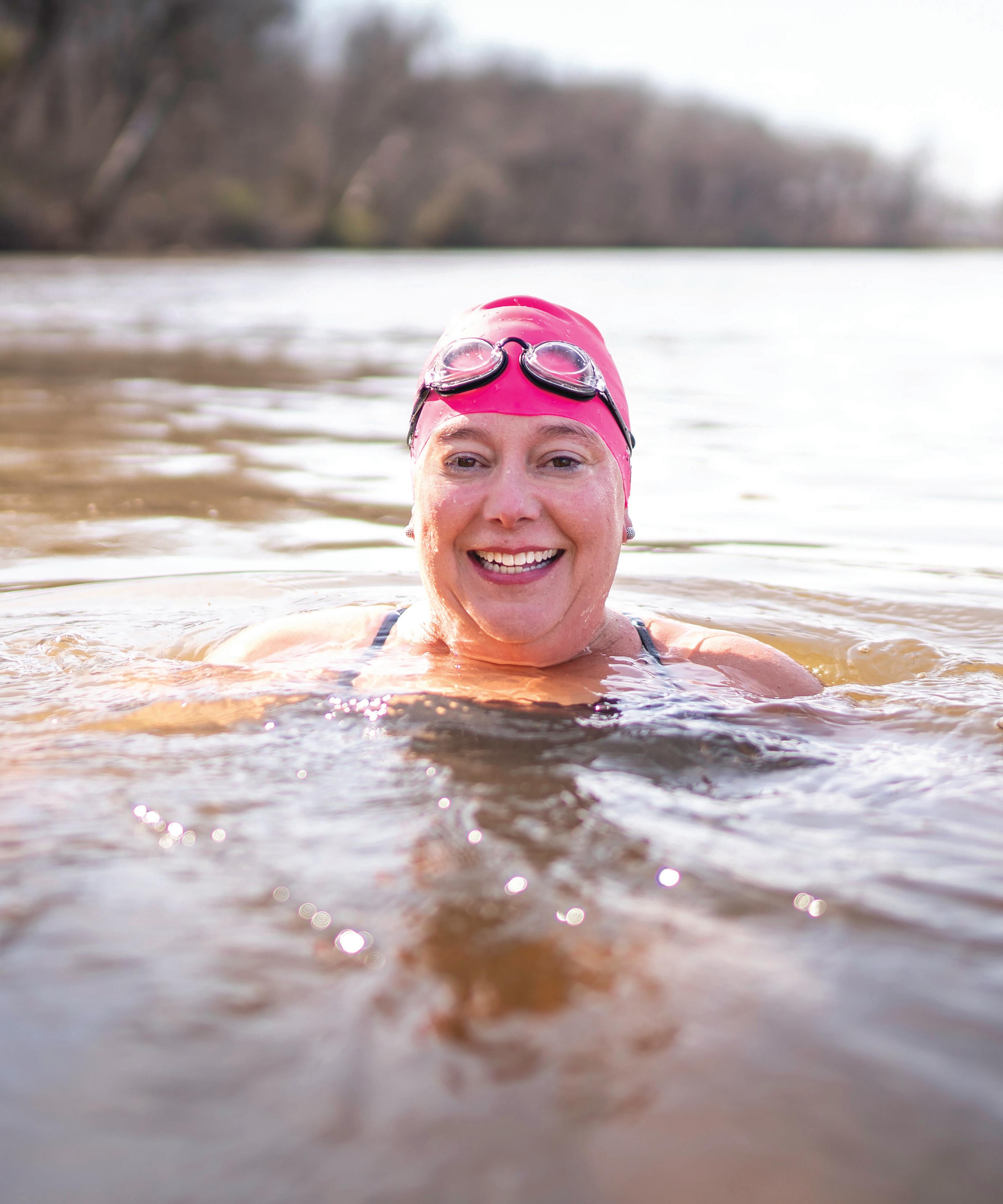

Open-water swimmers face immense physical challenges, but this attorney says the mental fortitude required is even more demanding — and it makes her a better lawyer.
PHOTOGRAPHY BY JAMIEThere’s a calming repetition that comes from swimming laps in the measured lanes of a pool. A certain number of strokes, then the approach of the wall, the twist and push to propel yourself into yet another lap to begin a new set of strokes. Lap, push, repeat. Lap, push, repeat, a sort of lullaby to the practiced swimmer.
Now imagine those same strokes but without the pool. No lanes, no black lines of paint keeping you moving in the right direction. Imagine yourself surrounded instead by a lake or even an ocean. The currents might help you along, or they might work you to the bone. The water itself could be freezing cold. Boat traffic brings additional obstacles, stroke after stroke after stroke taking you not to a wall to push into a new lap, but further out into the open water. For hours. Or even days.
If you’re wondering who on earth would want to battle such a scenario, meet a Spider attorney who lives for the sport of endurance swimming.
Courtney Paulk, L’00, is the first person in history to complete the Double Triple Crown of endurance
swimming. This means she completed a two-way crossing each of the English Channel and the Catalina Channel, as well as a double circumnavigation of Manhattan Island. Her longest recorded swim was 33 hours and 13 minutes — the Catalina Channel crossing. In 2023, she became an Honor Swimmer in the International Marathon Swimming Hall of Fame.
In her professional life, Paulk is the first female president of the Virginia-based law firm Hirschler, a status she reached much in the way she swims. If Paulk’s writing a big brief, she thinks, “Can I just write one sentence as opposed to four? It’s amazing how you can accomplish things when you break them down into their smallest possible denominator.” Paulk tackles each task by looking at it on a micro level. Each manageable minitask eventually builds into a completed brief.
“And that’s what I do on my swims,” Paulk says. “Can I take just ten more strokes? And when I’ve done that, can I take 10 more strokes? Ten strokes [feels doable], and you learn a lot about yourself in those 10 strokes. You see if you can push yourself just a little bit further.” Before you know it, you’re looking back on something that felt daunting but is now a part of history.
Endurance swimming is a lesson in how to handle the overwhelming. It’s about taking on the tough moments
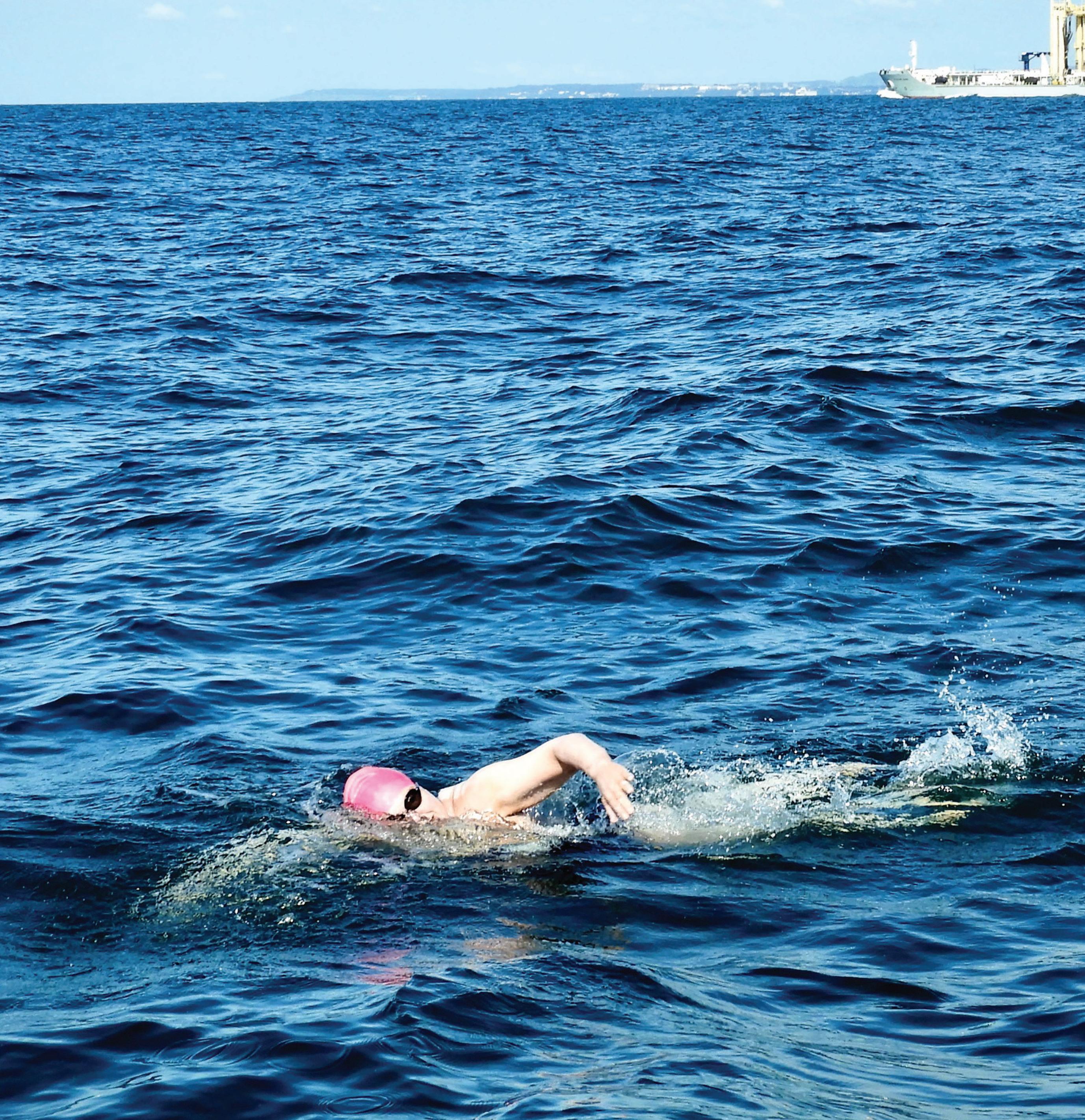
with a mindset that offsets the enormity of a task. And not just in the water — this is a story about how to manage what feels unmanageable no matter the context.
It’s a monumental task to go from the idea of, “I’d like to swim the English Channel,” to actually accomplishing it. Thankfully, Paulk has some advice that applies to swimming and a successful legal career.
Let’s talk numbers. “Doing swims like [the ones] I do, it’s 90% mental and 10% physical,” Paulk says. It’s understandable if you’re not convinced. Swimming the English Channel, for example, takes at least 12 hours. This means 12 hours of constant physical exertion. But for as strong as your body needs to be for that, your mind needs to be stronger.
“Most people fail in the English Channel because their brain gives out,” Paulk says. “They either think they’re too cold, or they think about the enormity of what they’re doing and decide they can’t do it.” There’s a noticeable distinction between reality and perception here: The temperature of the water is an indisputable fact, as is the technical length of the swim. But whether it’s too cold or
too long for the swimmer depends on how they perceive those facts. And that can determine whether they finish the swim.
Rachel Turk calls an athlete’s strengthened mindset “mental toughness.” As a sports psychologist at the University of Richmond, Turk asks athletes to consider not only how many hours they train their bodies each week, but how much time they spend training their brains.
“If your brain is not telling you the right things,” says Turk, “you’re less likely to complete something successfully. I like that cliche quote: ‘Whether you tell yourself you can or tell yourself you can’t, you’re probably right.’”
After years of mental training, Paulk recognizes those internal dark places more quickly. “Then I can use the tools I’ve gathered over the years to say, ‘OK, what am I going to do to get myself through this?’”
One of the biggest hurdles is addressing self-talk. Selftalk is what you say to yourself regularly. And if it centers on unhelpful assumptions — “I can’t do this,” or “I’m not clever enough,” — it can limit us to unnecessarily rigid behavioral patterns. It can kill our chance of success before we’ve begun.
Mental training can change that.
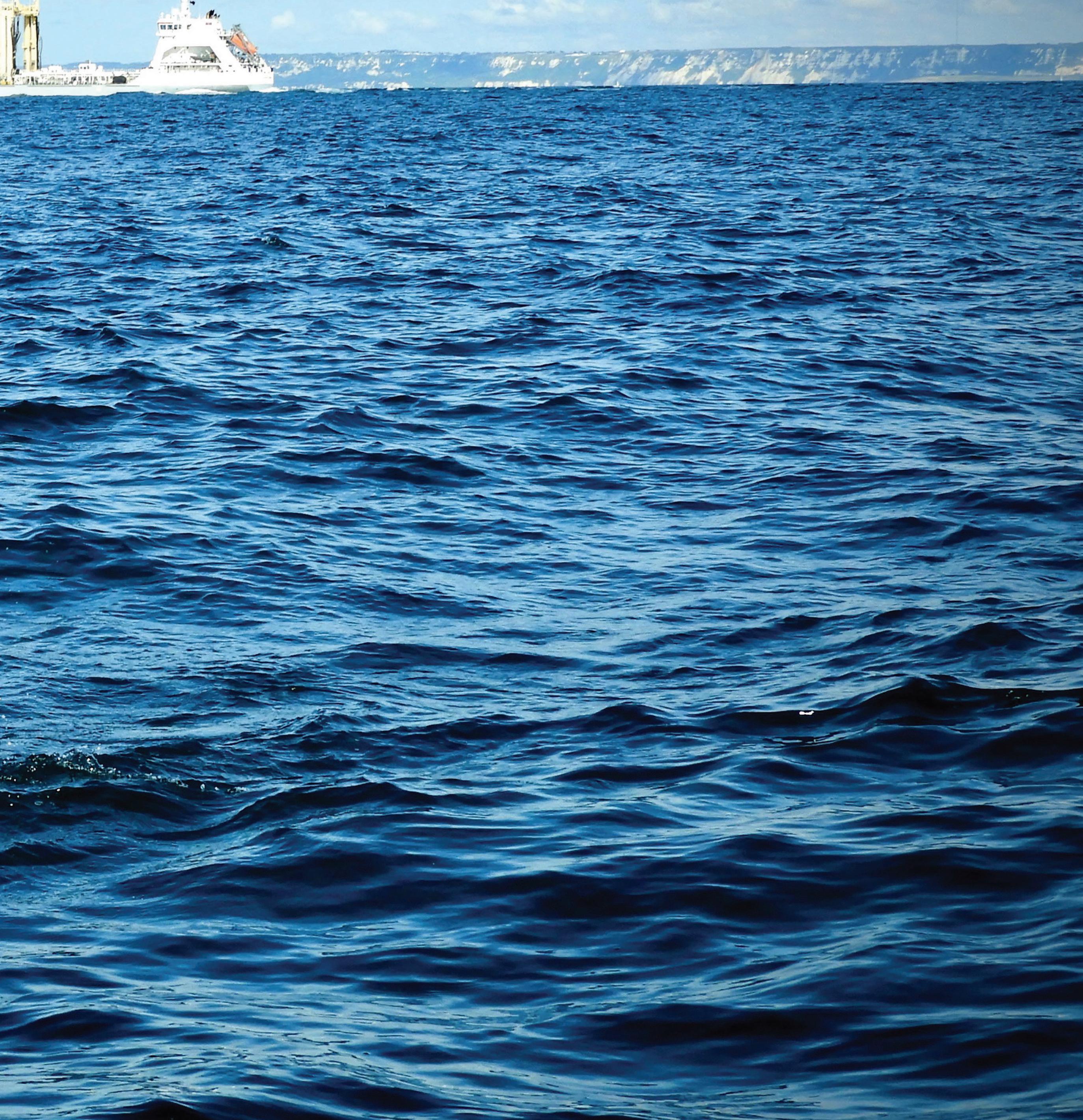
“ When I dive in, I leave everything else behind. When I hit the door at [my firm], I use that same tactic.”
“Train yourself to control your thoughts. You can’t control that first thought, but you can control what happens next and how you respond.”
“Train yourself to control your thoughts. You can’t control that first thought, but you can control what happens next and how you respond.”
STRATEGY NO. 1
Check
the facts of the situation
A productive thought isn’t necessarily a positive or happy one. It just has to be fact-based.
With a sport like endurance swimming, it’s easy to get caught up in how much your body hurts. Focusing on that pain, however, will make the swim more difficult. “Train yourself to control your thoughts,” Turk says. “You can’t control that first thought, but you can control what happens next and how you respond.”
When Paulk faces a tough hurdle at her law firm, she has a fact-based motto she clings to: “This is not as hard as swimming for 33 hours.” Perspective is everything.
STRATEGY NO. 2
Use grounding to stop racing thoughts
Anchoring your attention on something specific — like counting those 10 strokes as Paulk does — keeps your mind focused on one thing instead of a seemingly endless stream of thoughts.
“Whenever I have thoughts creep in, I deliberately push them away,” Paulk says. “Counting my strokes helps with this. I can say I’m going to count to 100, and then I’m going to count to 100 again, and that’s all you’re thinking about, right? You’re not thinking about what you’re going to have for dinner if you’re [focused on] counting.”
You might count breaths or try Paulk’s method for breaking tasks — nautical or legal — down into microsteps. Concentrate on something manageable to offset the overwhelm.
STRATEGY NO. 3
Visualization
“I teach a very specific visualization,” Turk says. “You use each one of your five senses to build up a picture like you’re actually in the situation. And then watch yourself complete whatever skill successfully.” Doing this when
you’re not physically in the midst of an activity better prepares you for the times when you are. Think of it like a dress rehearsal. Paulk — a theater major in her college days — learned to make the most of her time on stage through a vigilant rehearsal routine. “Leave it all at the door. You can’t [get into character] if you’re distracted by boyfriend problems. You have to leave everything else at the door.
“And that’s what I do with my swimming. When I dive in, I leave everything else behind. When I hit the door at Hirschler, I use that same tactic. You have to be present in the moment wherever you are. And whether that’s the pool or the office, that ability to be present has served me well throughout all aspects of my life.”
STRATEGY NO. 4
Incorporate self-care into your everyday schedule
While social media may sometimes suggest that this looks like candlelit bubble baths while sipping champagne, self-care has more to do with stress management. Routinely taking a moment from your day to recalibrate can regulate your parasympathetic nervous system.
“I go to the pool for my sanity,” Paulk says. “I’ll say to my colleagues, ‘I need to go to the pool now. It will be better for all of us if I go do that.’ And they’re like, ‘OK, cool.’ I’m a busy lawyer and president of a law firm, and swimming brings me peace.”
STRATEGY NO. 5
Adapt the above to suit your needs
Adaptability is critical, particularly in open-water swimming where the variables are often beyond one’s control. For Paulk, that unpredictability taught her to find comfort and confidence even when she had no idea what was about to happen. “I’ll have done all the training and prep work, everything I can do to get ready for that moment,” Paulk says. “But I can’t control the weather. I can’t control boat traffic. I got yanked out of the Baltic Sea once by the German marine police because they didn’t want me there. And there was nothing I could do about it. So I went and had breakfast instead.”
While being confronted by the German marine police might sound intimidating, Paulk says that having done so many swims over the years has built her sense of competency and confidence both in and out of the water.
“The more you go to court as a lawyer, the more confident you become. The first time I sat at the head seat in the boardroom, I was like, ‘Whoa, I’m at the head of the table now. And that’s kind of scary.’ Now, every month I sit at the head of the table, and it’s fine. It’s normal. The more you do something, the more confident you get.”
Of course, these strategies only work if you believe you can reach your goals. Paulk continued to push herself to such lengths as accomplishing the Double Triple Crown because, she says, “I wanted to find my limit. I would get out of a 12, 13, 14-hour swim and feel like there was still more in me — I knew I still had more.”
She sought out longer swims, double-circumnavigating Manhattan in 20 hours and 16 minutes, before finding her limit at Catalina. “I started on a Tuesday and finished on a Thursday. I was hallucinating for nine hours and for another 24 afterward. I saw two sunsets. It was bad.”
But Paulk’s Catalina swim also taught her that finding her limit wasn’t the goal. “I realized it was more about the journey. The whole journey. I like the picking of the swim, the training, figuring out how to navigate it around dayto-day responsibilities, and what you learn about yourself in each part of that journey.” The ritual of continued growth made each next swim part of a larger, lifelong goal.
“This is called self-regulation,” says Crystal Hoyt, a professor of leadership studies and psychology at UR’s Jepson School of Leadership Studies. “Growth mindsets help us achieve and engage with more beneficial goals. It helps us set learning goals, not performance goals.” It’s the difference between “I’m going to prove I can do this specific thing” and “I can develop that ability and do it better.”
The opposite of a growth mindset is a fixed mindset. A fixed mindset suggests you’re either successful or unsuccessful. You concede to defeat, thinking, “I’m not cut out for settlement negotiations. That’s why I failed.” Contrastingly, someone with a growth mindset can say, “OK, I didn’t negotiate that settlement successfully. Let me change my strategy.”
When the German marine police pulled Paulk from the Baltic Sea, she didn’t consider it a failure. Completing the swim wasn’t the sole marker for success. Success came in dressed as a new strategy — adaptability. Followed by a European breakfast with her team.
“I’m not just a 54-year-old woman who got up and decided one day that I was going to conquer these crazy long swims,” Paulk says. Nor did Paulk shock colleagues by becoming the first female president at Hirschler. She knew she could, so she made it a goal and put in the effort, shifting strategies as needed. “My husband would tell you that nobody will ever outwork me.”
As a guest on the podcast If She Can Do It, So Can You! Paulk encouraged listeners to realize just that: If you put your mind to it, you can do this, too. “If you’ve been sitting on a goal,” Paulk says, “remember that a goal without a plan is just a wish. So, take that first step to make a plan to accomplish that goal.” ■
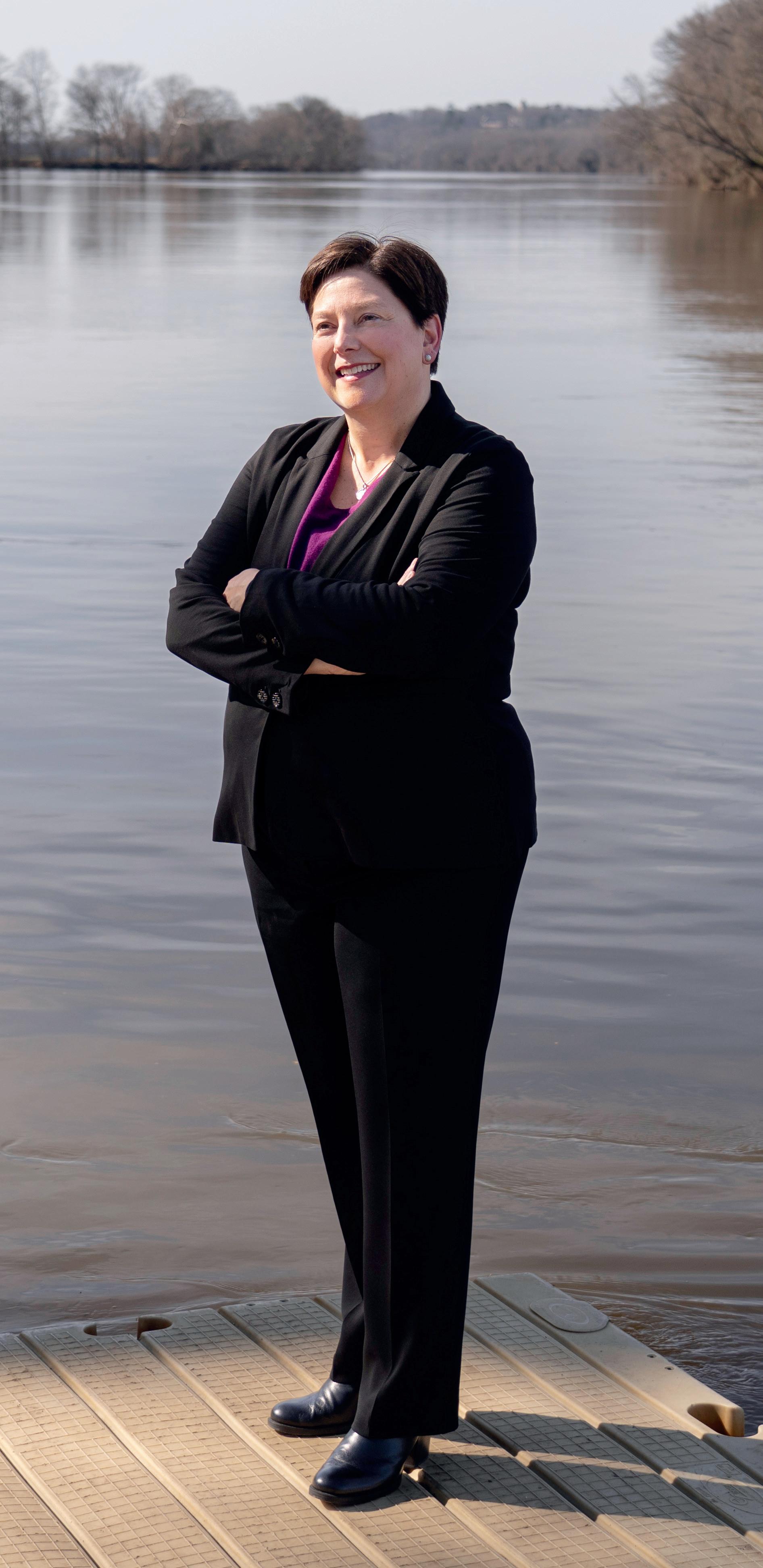
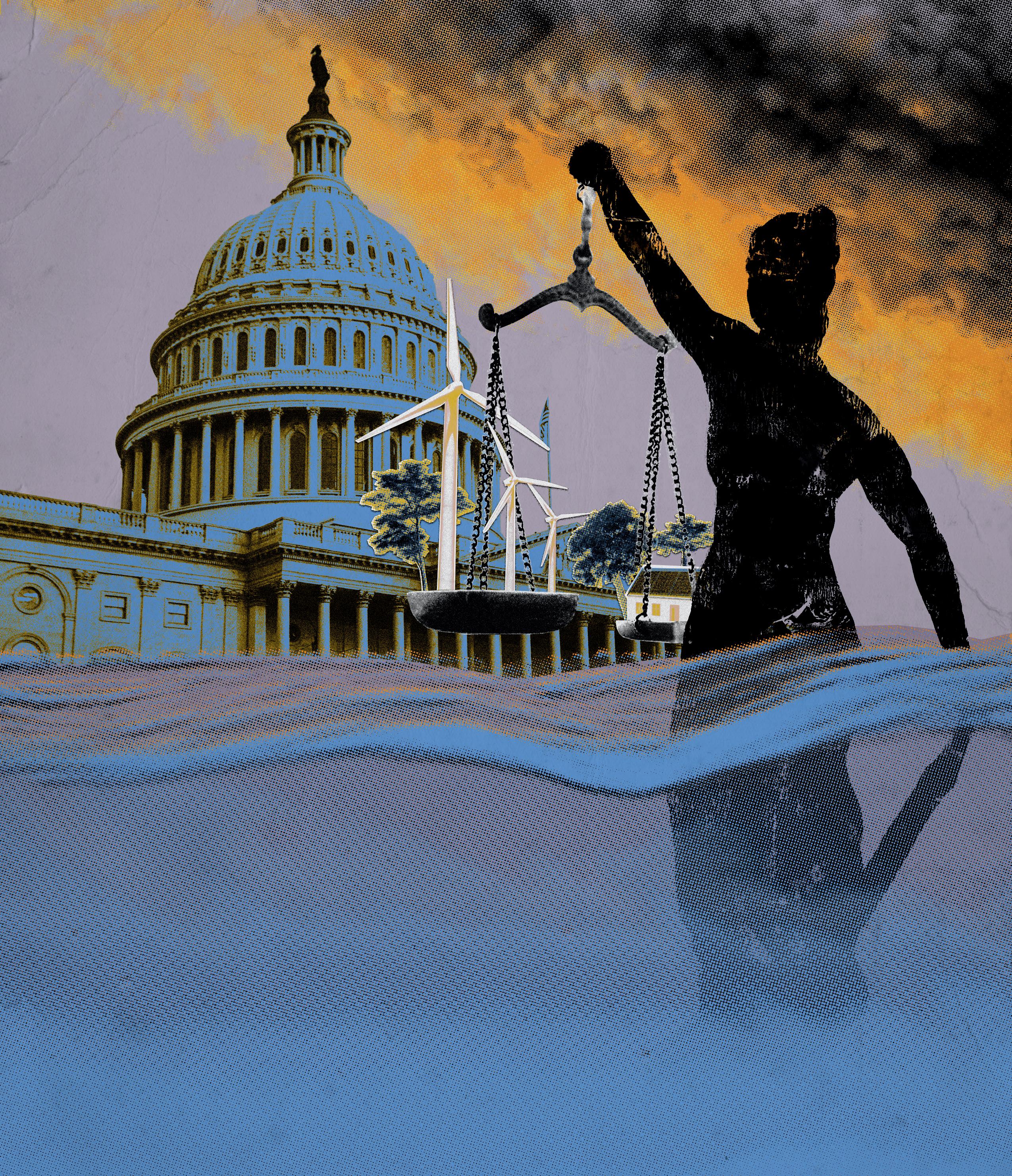
to shape the future of
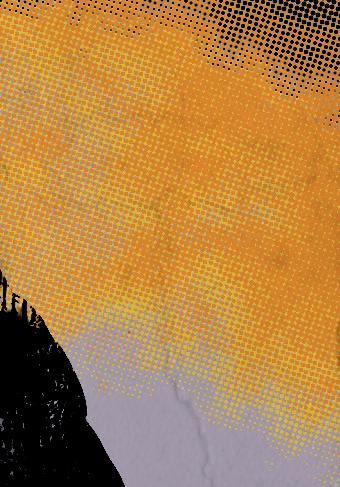
here’s no escaping that we’re living amid a climate crisis. In the U.S., atmospheric rivers are pummeling the drought-ridden West Coast with rain. Meanwhile, parts of the East Coast haven’t seen a major snow in years but have been hit by multiple hurricanes that would have been considered once-in-a-lifetime. Globally, floods, fires, and record temperatures are common occurrences.
While these conditions seem to test the limits of humanity’s ability to adapt, they also open the door for legal experts to contribute to potential solutions.
“When I think about the development of environmental law, people have to be able to see feel, touch, and smell the problem,” says Danielle Stokes, ’13, assistant professor of law. “In the 1970s, when federal environmental laws came to be, it was because rivers were catching on fire and people were dying. You could see the harm. Today, it’s tangible, and I think that opens up the possibilities for us to engage.”
Stokes, Noah Sachs, and Joel Eisen — all professors at the University of Richmond School of Law — are conducting research intending to shape the future of climate regulations. Here, they talk about how they’re facing the challenges of this unprecedented moment and the possibilities for the future.
For more than a century, monopoly electric utilities have been the driving force behind generating electricity and delivering it to most homes around the country.
For more than two decades, Joel Eisen, a nationally recognized expert on energy law and policy, has been wondering if there’s a better way.
Eisen explains that utility companies are fundamentally different from any other business. Companies are paid for the costs they incur to provide electricity service, plus they receive a government-guaranteed rate of return on any capital investments they make.
“They have every incentive to build big transmission lines and power plants,” Eisen says. “There’s a disconnect between the utilities’ financial incentives and the incentives to bring virtual energy onto the power grid.”
Virtual energy — a term coined by Eisen and his co-authors Felix Mormann of Texas A&M University School of Law and Heather Payne of Seton Hall University School of Law — presents an alternative to traditional utility companies. Rather
than rely on large-scale coal and natural gas-fired power plants, virtual energy resources (VERs) stitch together solar and wind power, battery storage, and electric vehicles which currently live at the edges of the grid. For instance, VERs might pull energy from one homeowner’s solar panel and another’s electric vehicle, as well as a larger-scale wind farm, into an aggregated system that can be distributed as needed. The result is a diversified electric grid that is safer, cleaner, and more resilient.
“Someday, I could band together with 10,000 of my neighbors to offer my output from rooftop solar as a resource on the grid, and I might actually get paid for it.”
—JOEL EISEN
“Someday, I could band together with 10,000 of my neighbors to offer my output from rooftop solar as a resource on the grid, and I might actually get paid for it,” Eisen says. “That creates an economic incentive for the owner of a VER to be part of the revolution. Or, if you have more power from your solar panel than you need, you could, in theory, trade with your neighbor.”
Eisen acknowledges it’s a hard sell. “Right now, incumbent utilities have no interest in making that possible.”
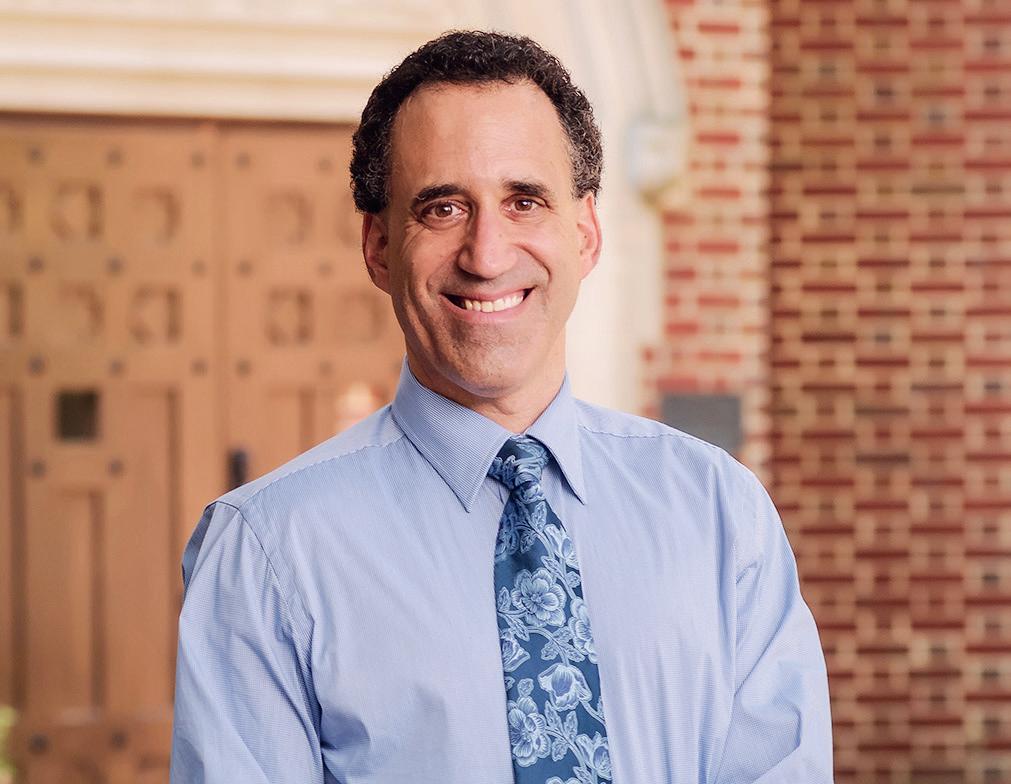
Such a system, however, would be complicated and expensive to assemble. And because it doesn’t require power companies to build anything, they’re unlikely to get that rate of return — meaning there’s little motivation to support the infrastructure needed for robust virtual energy networks.
But Eisen still thinks there’s a way to bring virtual energy to the forefront. In a recent article in Illinois Law Review, Eisen and his co-authors propose a separation of responsibilities through the creation of independent distribution system operators (IDSOs).
“Utilities have extreme conflicts of interest,” Eisen says. “At times they act like gatekeepers and adopt policies that make it more difficult for us to bring our resources together to form the equivalent of a power plant. But when they create their own programs, they have a natural interest in promoting their resources at the expense of those that are developed by their customers.”
In most areas of the U.S., utility companies hold a monopoly over both the creation and distribution of power. With IDSOs, control of distribution, including the wires and poles that transmit electricity to homes and offices, would be handed to an independent nonprofit organization. This third-party operator would have no stake in the electricity generation market, resulting in increased market access, transparency, and reliability and reduced barriers for entry for VERs.
Eisen, Mormann, and Payne say that making that transition will require a “grand bargain” with substantial benefits for utilities that voluntarily hand over control of distribution. In their paper, they envision three key incentives: payments for assets stranded by regulatory changes, compensation for the use of the transmission wires that would remain under utility ownership, and removal of restrictions on entry into certain power generation businesses.
While Eisen believes these incentives could bring utilities to the table, he also believes larger forces are at play and could indicate the time is right for such a major overhaul of the nation’s energy grid.
First, renewable energy sources are far more commonplace and accessible, with homeowners installing solar panels and wind farms. And demand response systems, which pay people to use less energy, have become more sophisticated.
In addition, utility companies are facing climate risks that threaten their operations. It is increasingly in their interests to consider creative solutions to address climate change and reduce greenhouse gas emissions.
“Twelve years ago, [VERs] sounded like the stuff of fantasy,” Eisen says. “It’s much more possible today.”
In 1972, the Southern California Law Review published an article by its law professor Christopher Stone that posed a groundbreaking question: Should trees have legal standing?
In the article “Should Trees Have Standing? — Toward Legal Rights for Natural Objects,” Stone argued that natural objects like trees and lakes should have legal personhood and the ability to sue for harm. Based on that theory, these natural entities had the potential to gain standing in cases that environmental organizations could not.
Nearly 30 years later, cultural historian Thomas Berry took this concept a step further when he founded the rights-of-nature movement. Among the movement’s 10 guiding principles, he asserted that “rights originate where
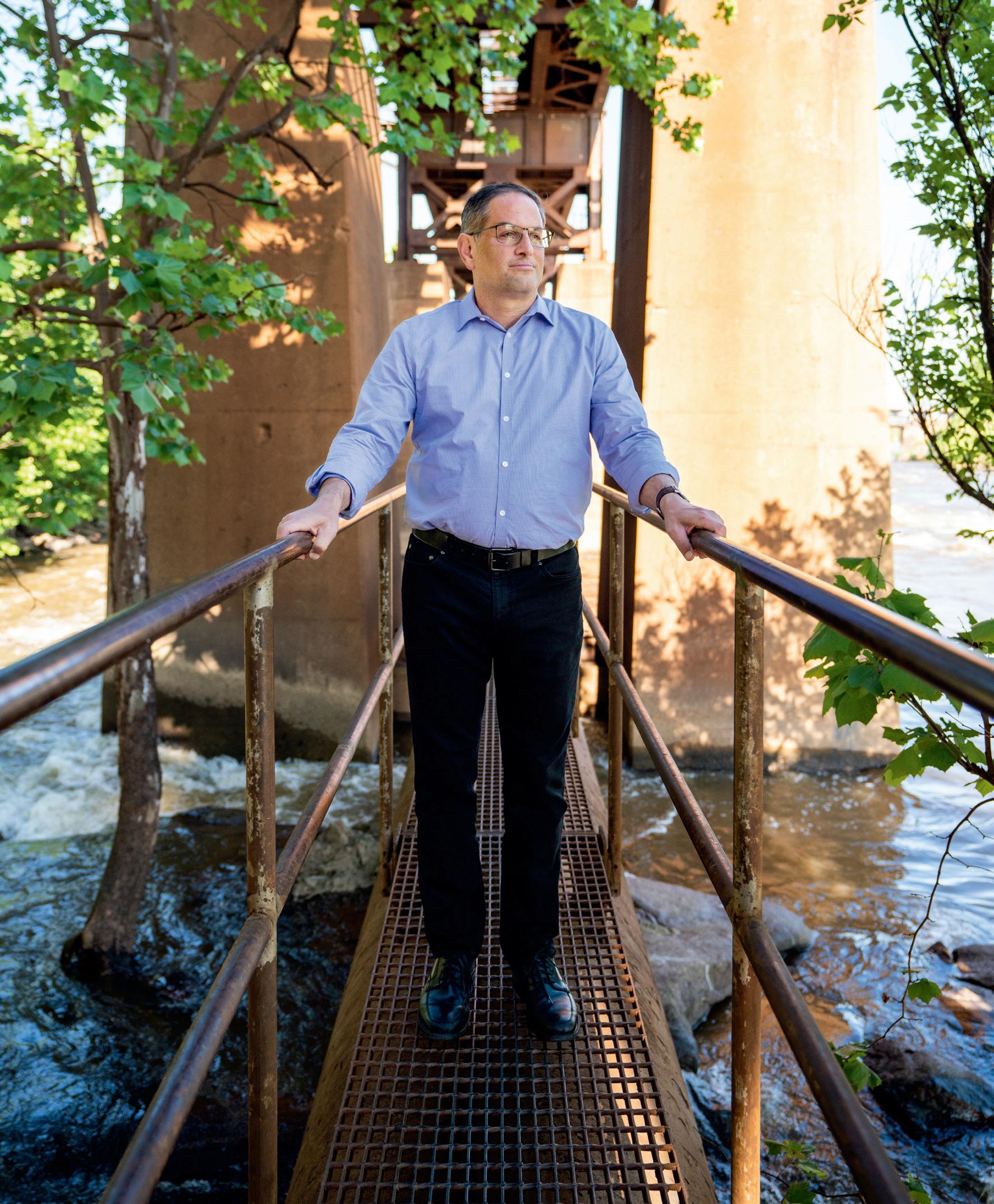
existence originates” and that all living things have legal rights, even if they lack feeling or sentience.
The idea has gained substantial traction in recent years and is no longer just a legal theory. More than 50 communities and four tribal nations in the U.S. have enacted rights-of-nature ordinances that protect a natural community’s right to exist and flourish. Globally, Ecuador, Bolivia, India, New Zealand, and Panama have granted legal rights to nature.
“[The rights-of-nature movement] is calling attention to the intrinsic value of living things,” says Noah Sachs, director of Richmond Law’s Robert R. Merhige Jr. Center for Environmental Studies. “As an environmentalist, I believe that nature has intrinsic value — and not just in the situations where it is useful to us. Our laws and legislation should recognize that. We should go much further, in terms of ecological protections, than relying on nature reserves, national parks, and wilderness areas to preserve nature for now and for the future.
“But as I read more and more about the rights-of-nature movement, I became a critic.”
Sachs argues that the movement — and related legislation
“ As an environmentalist, I believe that nature has intrinsic value — and not just in the situations where it is useful to us. Our laws and legislation should recognize that.”
—NOAH SACHS
— is often vague. For instance, while legislation may grant rights to a plot of land, a lake, or a forest, it’s often not clear how those rights might limit human behavior.
“Does that mean humans can’t fish in the lake?” Sachs says. “Can we build near the lake? Can we build a quarter mile from the lake if it will result in sediment runoff? My argument is there are so many details that need to be worked out, and that’s better done through detailed legislation rather than a simple law that says the lake has legal rights.”
Sachs is also concerned that the ambiguity grants an outsized authority to judges — who may lack expertise in environmental science and policy — to interpret the laws and strike a balance between the new rights of nature and the existing rights of humans.
“That is handing tremendous, unaccountable power to judges,” he says. “It would judicialize most of environmental protection instead of having Congress and regulators in the driver’s seat.”
That dichotomy is currently playing out in the courts. Of the 50-plus localities with rights-of-nature laws, six have been challenged, usually by industry. The localities have lost all six cases because the ordinances are too vague, violate due process, or violate state and federal law.
Sachs, who has been approached by rights-of-nature organizations to advise them, says he would encourage groups to spell out exactly what they want to protect and what duties those new rights will impose on humans.
On climate change, Sachs argues that lawsuits between an injured natural entity and a corporate or human defendant would do little to address the problem. Instead, he believes the movement should focus on more tangible initiatives like incentives for energy efficiency, reducing the barriers to building renewable energy, strengthening
“Has a community historically been overburdened by harmful land uses? Are we balancing new development with existing structures such that people are not overburdened?”
—DANIELLE STOKES, ’13
regulatory limits on pollution, improving land use policies, and raising fuel economy standards for cars.
Sachs says he understands why people are frustrated with slow progress and want to start from scratch with a new framework. But Sachs believes the Clean Air Act of 1970 and the Clean Water Act of 1972 have been “remarkably effective” for environmental protection. He says that the states and the federal government can enact new legislation to address the current climate crisis.
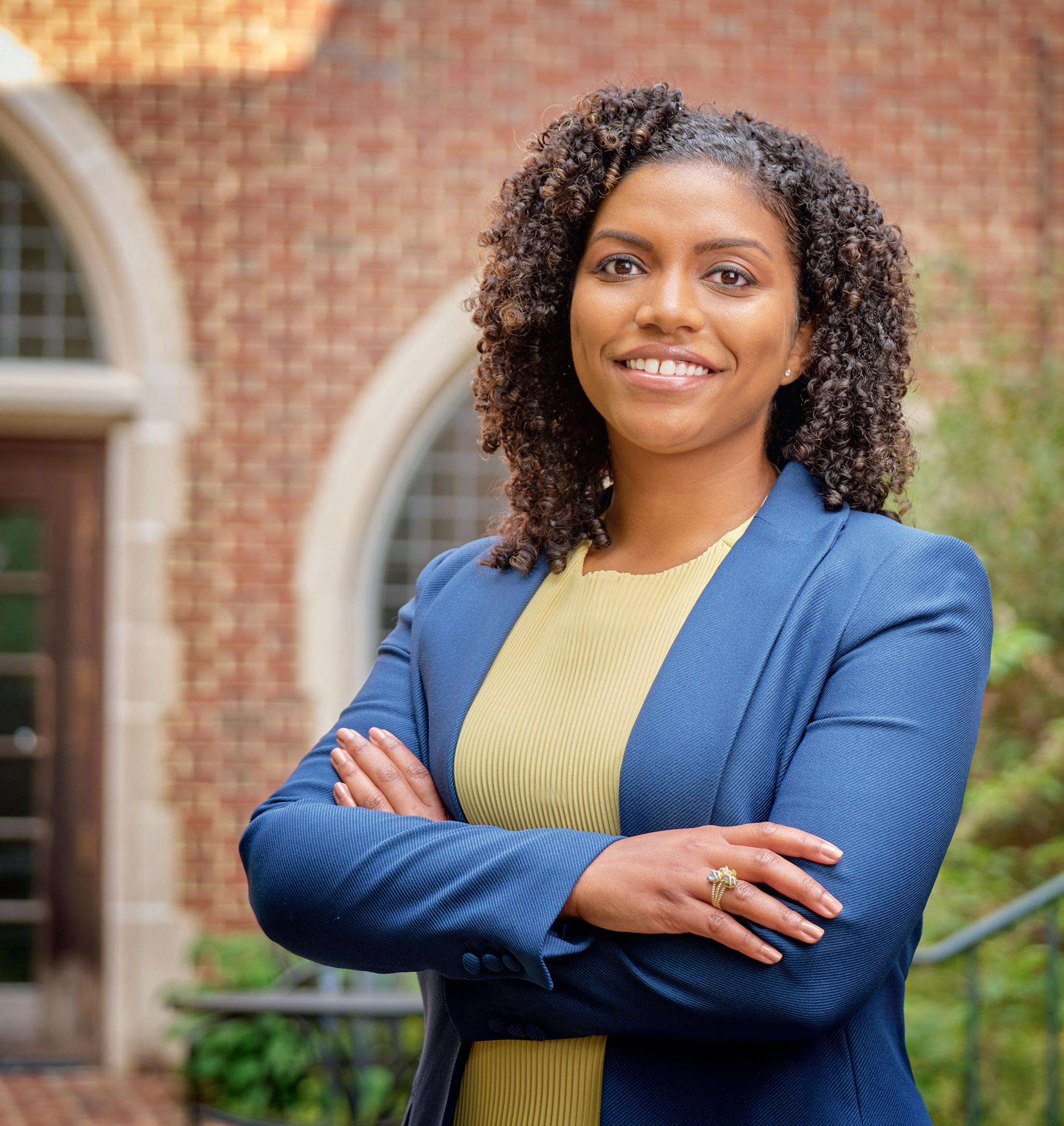
“I’m not willing to jettison those older statutes in favor of this new rights-based approach,” he says.
In fact, Sachs was involved in a project to study the effects of sea level rise on chemical storage and industrial sites along the James River. Working with the Center for Progressive Reform, Sachs and his colleagues used mapping software and census data to pinpoint vulnerable sites.
In their report, “Toxic Floodwaters: The Threat of Climate-Driven Chemical Disaster in Virginia’s James River Watershed,” they identified 1,095 industrial facilities that are flood-exposed due to storm surge, heavy rainfall, or sea level rise. Of those, 91 would be flooded by just 1 foot of sea level rise, which climate scientists expect to occur by 2050.
“We’re among the first in the country to do that kind of detailed mapping of industrial sites versus sea level rise,” he says.
Since then, Sachs has been working with legislators to pass a bill that would protect these chemical storage areas. He also published an article in the Columbia Journal of Environmental Law outlining what state and federal governments could do to protect industrial sites from severe storms and sea level rise.
“Virginia is behind the curve on this,” Sachs says. “The Clean Water Act is the main law we use to protect the James River and the Chesapeake Bay, but it’s mainly about intentional discharges into Virginia waterways. I’m look-
ing at accidental discharges, which are not currently regulated. We have over 1,000 storage tanks storing hazardous chemicals right next to our waterways. I’m trying to head off this potential future threat.”
It’s well-established that fossil fuels are the primary driver of climate change, accounting for more than 75 percent of global greenhouse gas emissions and nearly 90 percent of all carbon dioxide emissions. As these greenhouse gases are released into the air, they trap the sun’s heat and contribute to global warming.
But fossil fuels and the traditional power plants that burn them also have a dramatic effect on those living in neighboring communities, many of which are low-income. As the world makes the transition to renewable energy, however, we have an opportunity to ensure a more just distribution of the impacts — and the benefits — of new infrastructure.
Danielle Stokes, who focuses on sustainability and equity in land use planning, is part of an interdisciplinary team of geographers, legal scholars, and public policy experts exploring how to do just that. The team of researchers received a three-year grant of nearly $500,000 from the Alfred P. Sloan Foundation to support
their work on the project, titled Just Energy Transitions and Place.
Land use is a critical element of the energy transition process. The Princeton Review’s “Net-Zero America” report suggests that the U.S. will need to allocate approximately 228,000 square miles — an area larger than Wyoming and Colorado combined — for solar and wind farms and other renewable energy infrastructure in order to achieve net-zero emissions by 2050.
Achieving this will require replacing fossil fuel plants with renewable energy production and repurposing forest, crop, and pasture lands where sun and wind are abundant. It will also depend upon convincing resistant communities. For instance, rural communities may not want to disrupt their pristine landscape with solar panels and wind turbines, while residents of coal towns may feel deep cultural ties to their mining history that are difficult to abandon.
When considering a project’s location, Stokes says it’s also important to take a comprehensive look at land use and siting decisions over time to more equitably distribute the impacts of energy production moving forward. To do so, it is essential to ask the right questions.
“Has a community historically been overburdened by harmful land uses?” she says. “Are we balancing new development with existing structures such that people are not overburdened? Who is going to bear the cost? Do homes receive the benefit of renewable energy from the project in their community, or are they still receiving electricity from fossil fuel-related sources?”
adapt to climate change — it all came together seamlessly as I transitioned into academia.”
In her 2022 Minnesota Law Review article “Renewable Energy Federalism,” Stokes recommends a centralized federal governance structure to streamline larger-scale development projects and ensure an equitable impact on local communities. The article was listed among the top 20 articles by the Environmental Law and Policy Annual Review, one of the highest honors in the field of environmental law.
She explains that some states have a standardized process, but most siting decisions are considered a local issue. If, for example, a developer wanted to tap into transmission lines that crossed the border between North and South Dakota, they would have to know the parameters for both states and several localities. With federal oversight, the government would be able to look at the country as a whole, make recommendations for best practices, and simplify the development process.
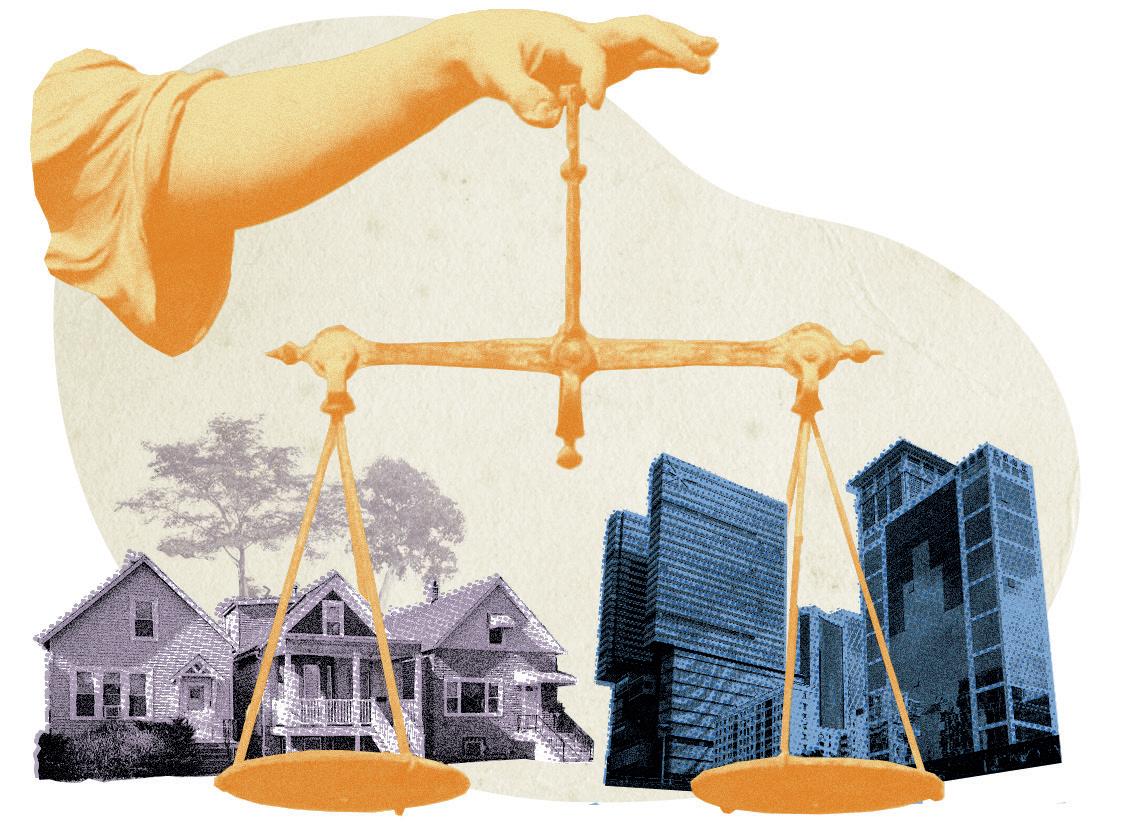
“Because of the urgency of climate change,” Stokes says, “this is the type of project where we want some federal involvement, recognizing that we still want to retain rights in local governments and states.”
Developers could also tap into federal resources like the Council on Environmental Quality’s Climate and Economic Justice Screening Tool. This interactive map gives insight into areas that have been overburdened by hazardous waste facilities and extreme air pollution; it can help guide decision making around new projects and investments.
Stokes brings to her research a background in land use and real estate law as an attorney for McGuireWoods. She worked with developers and utility companies to site thousands of acres for solar and wind farms.
Along the way, she learned the importance of engaging with the community throughout the process — and why some community members are more receptive than others.
“Some would say their crops are underperforming or, ‘My family no longer utilizes the property for agricultural purposes,’ so I will gladly take this lease payment,” she says. “Conversely, others were resistant, inquiring why their property was being considered.
“Having that experience from the procedural and public engagement side, in addition to understanding the land rights and how to manage an issue that helps us combat or
“If a developer purchases or leases land [in those areas], there could be a new economic incentive for the population or a tax revenue that comes in,” Stokes says, “which allows the local government to make better decisions to help mitigate or adapt to climate change.”
Stokes says working in environmental law presents an opportunity to synthesize expertise from across disciplines and take that broader view of a problem.
“I tell my students, ‘You don’t have to be an expert in data, but you have to be able to understand why the scientists made a decision,’” she says. “[As lawyers,] we are trained to ask questions and get information. To identify areas where there has not been accountability. To invite in economic, scientific, technological, and health perspectives and not let one of those constantly dominate and silence another.
“Our job is to draw from all of these disciplines and bring them together to create the laws and policies.” ■
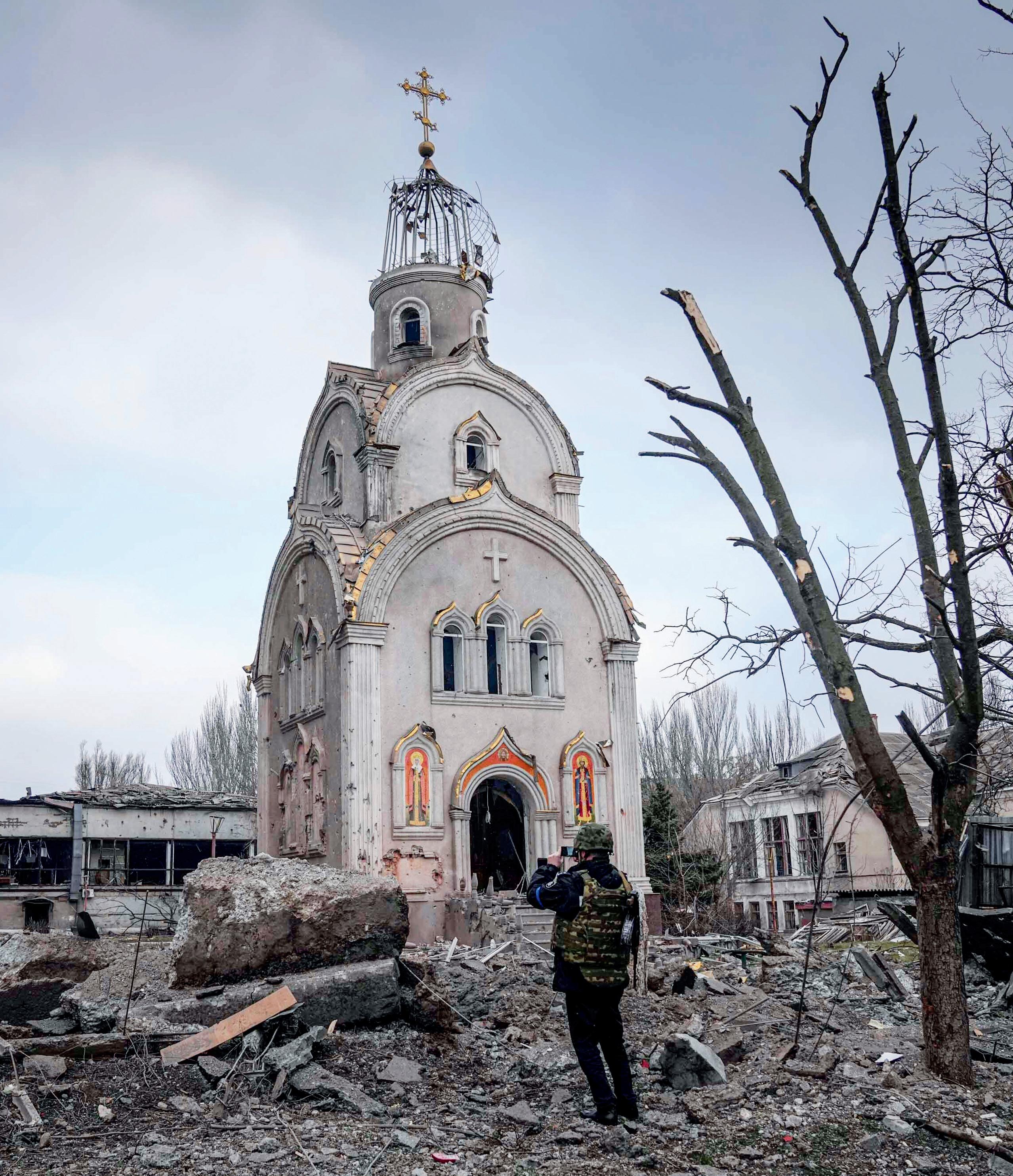
Professor Chiara Giorgetti is co-developing a mechanism to hold Russia accountable for violations of international law in Ukraine.By Matthew Dewald
When Russia invaded Ukraine in February 2022, Mykhailo Puryshev lived in the eastern city of Mariupol. He was a business owner who operated a restaurant and nightclub called Evo. It sat next to the campus of Pryazovskyi State Technical University, whose students it served.
On March 9, an aerial Russian attack on their neighborhood forced Puryshev and the students to run for their lives. He filmed as they rushed into a university building, later posting the video on TikTok. The video is mostly dark, but the audio captures the sounds of nearby explosions, adults screaming, children crying, and an atmosphere of chaos and terror.
According to Human Rights Watch, the attack that day killed at least two and injured one. It also did significant damage to the university’s buildings, forcing it and its students — Puryshev’s customer base — to relocate 150 miles away, in Dnipro.
Evo became a shelter as the attack on the city intensified. Puryshev spent the next three weeks evacuating approximately 200 people from the basement of his former business during six harrowing trips. He left the city for the last time in late March.
In May, after a three-month siege, the city fell into Russian hands, becoming a symbol of both the war’s horrors and Ukrainian resistance. In a video Puryshev posted on TikTok in late January 2024, he expressed a simple wish: “I want to go home.”
Military campaigns will in all likelihood determine whether he ever can. An eventual Ukrainian recapture of
his city will not, however, restore what Puryshev and people throughout Ukraine have lost because of Russia’s war. Retaking territory will not compensate for homes fled or businesses and communities destroyed, to say nothing of people injured and killed by the fighting.
Richmond Law professor Chiara Giorgetti has emerged as a leader of international efforts to address some aspects of their loss. In her scholarship and through active roles with international organizations, she is advancing concrete efforts to hold aggressors financially accountable and provide compensation to the war’s victims.
“When Russia invaded Ukraine, it was such a flagrant violation of international law that a lot of international lawyers said, ‘Well, what can we do? What are the instruments that exist?’” she said. “We quickly thought that we had to make sure that people who were injured because of the invasion received some kind of compensation.”
In December 2023, Giorgetti flew to The Hague in the Netherlands to begin one of her most prominent roles in the effort. She is vice chair of the Register of Damage for Ukraine, a seven-member board for a body created within the framework of the Council of Europe. The board’s job is to set the register’s rules and procedures and begin preserving evidence for the eventual adjudication of claims against Russia.
“It is incredibly stimulating and at the same time very humbling,” she said. “My colleagues are incredible international lawyers, and we are creating something new.”
Something new, indeed. The register is the most recent iteration of a little-known international legal instrument that Giorgetti has both studied and practiced in through-
A Ukrainian serviceman takes a photograph of a damaged church after shelling in a residential district in Mariupol, Ukraine, March 10, 2022.
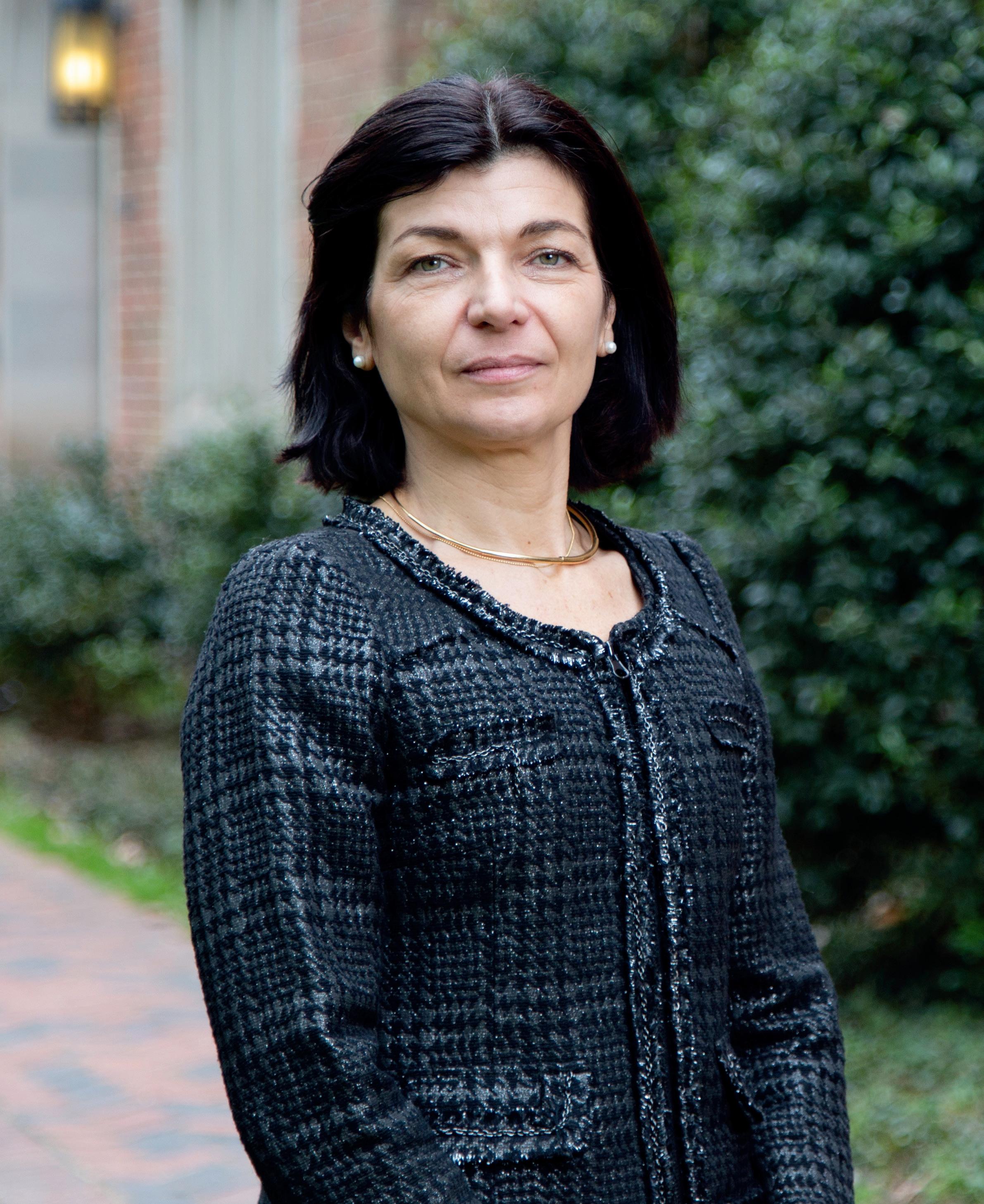
United States negotiated by Supreme Court Chief Justice John Jay. Jay’s Treaty, as it is known, created three claims commissions to adjudicate border disputes, resolve unpaid debts owed to British merchants, and settle various maritime claims. The model succeeded well enough that ICCs continued to be created and adapted throughout the 19th and 20th centuries — for example, suppressing the transatlantic slave trade, resolving a naval blockade of Venezuela’s ports, and imposing reparations on Germany after World War I, among other purposes.
Over the last 50 years, ICCs have continued to be created consensually by treaty or imposed upon aggressors by the international community. In 1981, Iran and the U.S. agreed to create a claims commission to settle disputes arising from the 1979 takeover of the American embassy in Tehran. In 1991, the UN Security Council imposed the United Nations Claims Commission on Iraq in response to its unlawful invasion and occupation of Kuwait. Over the course of the UNCC’s 30-year run, the Iraqi oil revenue was used to pay out more than $52 billion in compensation awarded to more than 1.5 million claimants.
Giorgetti was professionally involved with the UNCC as a senior associate with a firm representing the government of Iraq. She also represented Eritrea during its participation in the Eritrea-Ethiopia Claims Commission, which was set up in 2000 after armed conflict between the nations.
“Each claims commission is different,” she said. “The UNCC and Eritrea-Ethiopia Claims Commission were similar, but they were not the same. The UNCC had many more claimants, many more states, and had a lot of money. The Eritrea-Ethiopia one was very small; one of its main questions was where to find the money for compensation.”
“When Russia invaded Ukraine, it was such a flagrant violation of international law that a lot of international lawyers said, ‘What can we do?’”
out her career: an international claims commission, or ICC. These ad hoc bodies settle monetary claims for harm, a sort of civil litigation counterpart to criminal proceedings that happen at places such as the International Criminal Court or the European Court of Human Rights.
Unlike standing courts of international justice, each ICC is a unique instrument tailored to specific circumstances and challenges. Their modern origin point is the 1794 treaty between Great Britain and the newly independent
This professional experience and her extensive scholarship make Giorgetti one of the world’s leading experts on the evolution of claims commissions. Her background made her a natural choice when the government of Ukraine reached out to international lawyers for guidance on how it might secure reparations from Russia. In May 2022, Volodymyr Zelenskyy, Ukraine’s president, appointed her to a working group formally advising the government on reparations options. The working group’s efforts laid the groundwork for the passage of a 2022 UN General Assembly resolution holding Russia accountable for violations of international law in Ukraine and recognizing the need for a mechanism for reparations.
This step was important for establishing the legitimacy of efforts to hold Russia legally accountable, but it also pointed to a major hurdle for any claims commission
focused on Ukraine: Russia’s status as a veto-holding, permanent member of the UN Security Council. The Security Council had been the binding authority for forcing Iraqi participation in the UNCC, but Russia’s veto power prevents any such coercion in this case. Likewise, a treaty agreement such as the one between the U.S. and Iran in 1981 seems highly improbable, barring some dramatic battlefield development or change in Russian leadership. That’s why the Council of Europe’s action to create the Register of Damage for Ukraine — the body on whose board Giorgetti sits — was so important. It picked up the General Assembly’s call for the creation of a mechanism for reparations for Ukraine.
“The international community must ensure the mechanism works,” she said. “It’s very important that even veto-holding countries like Russia can be held accountable. Having the veto power doesn’t mean that you’re immune from that. It’s not a perfect system, but it’s a system that shows there are instruments that exist and could work.”
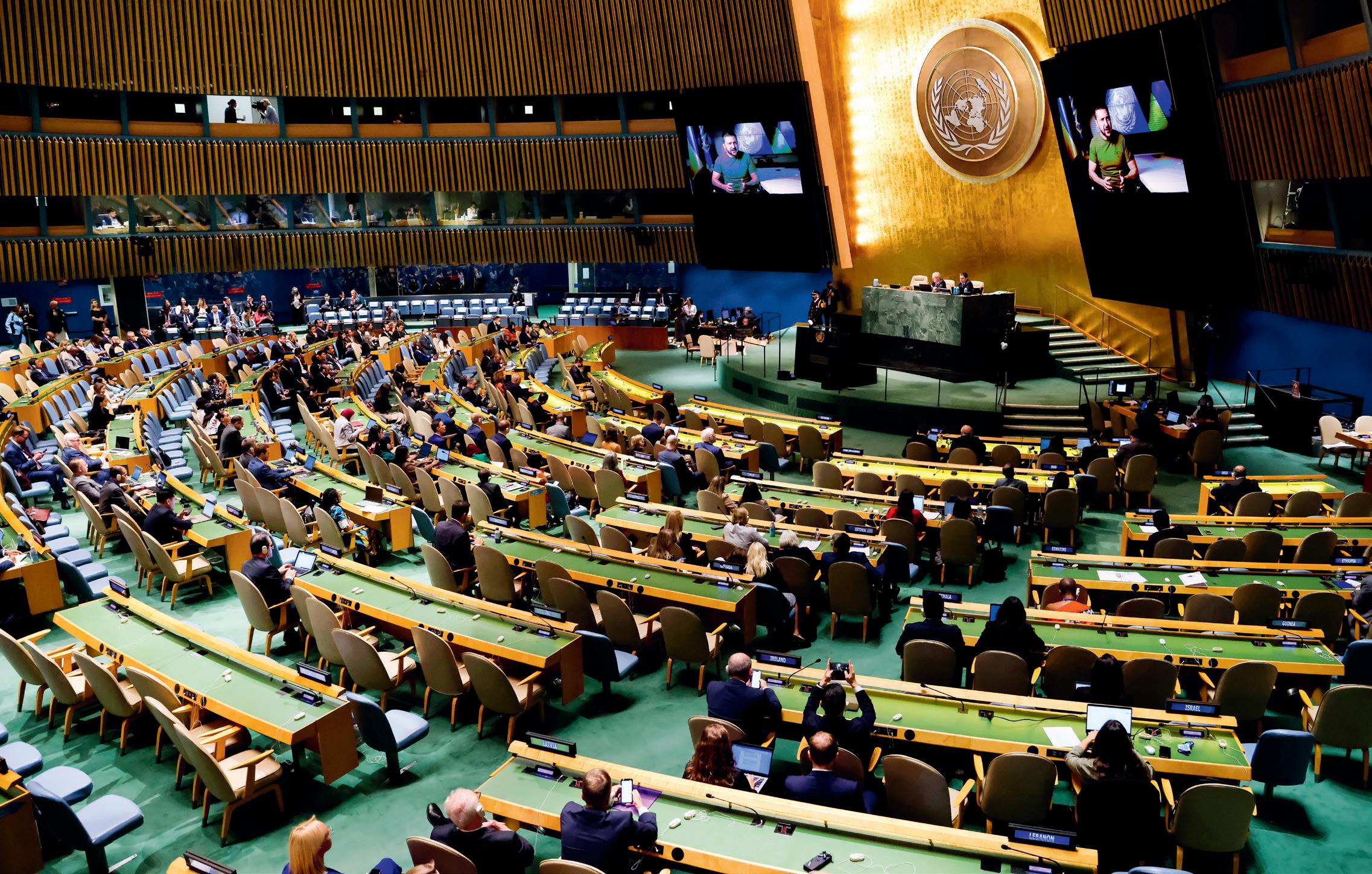
An aspect of the Ukraine claims commission that makes it unique is the fact that as it undertakes its work, the war continues to progress, and the harms multiply.
“This is the very first time,” Giorgetti said. “In the past, the event that caused the creation of the commission had terminated, but here the aggression is continuing, so we will continue to look at injuries that are occurring. In terms of collection of evidence, it’s very important to act now so that we can maintain the evidence we have.”
The board’s initial tasks are creating rules and procedures for the Ukraine Register. It will also define legitimate claim categories and claimants so that the register can begin to gather and preserve evidence for later claims adjudication. There remain many outstanding issues to solve, not the least of which is where funds for providing compensation will come from. One possible solution is seizing Russian assets that are currently frozen in Western financial institutions. Legal scholars are divided on the legitimacy of doing so, and politicians and economists are weighing the potential long-term implications.
Questions such as that are beyond the current scope of the Ukraine Register, which is focused on registering eligible claims and laying the groundwork for later claims adjudication and compensation. Giorgetti and other board members draft and review documents and meet virtually as necessary. Four times a year, the board meets in person, which means that she is intermittently flying from her classes at Richmond Law to the Hague.
These dual roles of professor and practitioner are important for her as a researcher and for her students, she said. Her professional trajectory provides a good example of why. One of her early career opportunities came about when she was a research fellow at New York University and met a professor who was also actively working on cases. One of the cases required help from someone with legal skills who could read documents in Italian, Giorgetti’s first language. Giorgetti progressed from that work to a position with the UN, putting her on the path to where she is today.
“I always try to have a little step into practice — and maybe now I have more than a toe in, maybe half my leg,” she said. “As an international lawyer, I think you have to practice. It’s fundamental to grow as an academic and be able to teach.”
Her connections and practice offer phenomenal experiences for her students. During recent practicum courses focused on international law, her students worked with the codification division of the United Nations and with the International Court of Justice on projects related to the use of expert witnesses and questions such as whether social media posts by leaders are binding expressions of state positions.
Those projects introduced students not only to technical legal questions, but also to a sense of how much global impact international law practice can have. “I like the fact that this work is consequential,” she said. “It looks at core questions that I see as fundamental in our lives.” This impact, ultimately, is what drew Giorgetti to the field —the chance that she can help people like Puryshev recover some of what violations of international law have cost them. ■
Ukrainian President Volodymyr Zelenskyy from video addresses the 77th session of the United Nations General Assembly, Wednesday, Sept. 21, 2022, at U.N. headquarters.

Over the past decade, Professor Danielle Wingfield, L’14, has followed a remarkable career path. The Sharpe Community Scholar from William & Mary attended law school at Richmond before receiving her doctorate at UVA. In partnership with the Child Advocate Law Firm, Wingfield served as guardian ad litem providing legal counsel for parents in need and tackling discrimination cases in school districts. She also taught at the UVA Schools of Law and Education and the Center for Civil and Human Rights at Gonzaga University School of Law.
Wingfield’s journey brought her full circle last fall when she returned to Richmond Law, this time as a member of the faculty.
“I had a very positive experience here at Richmond. It was a great life choice,” she said, fondly recalling the pivotal moment she knew Richmond was the right law school for her. On Admitted Students Day, a chance encounter with professor Jonathan Stubbs, who would later become her adviser, played a crucial role in her decision. “He came across as genuinely concerned for my well-being as a prospective student,” she said.
“The family law clinic is what initially drew me to apply to Richmond Law because I wanted to become a family lawyer,” Wingfield said. “It was as if the heart and community of Richmond were calling to me.”
Wingfield has worked closely with the director of the Family Law Clinic during her time as a student. By her third year, she was using her practice certificate to try cases in courtrooms throughout Richmond. One summer, Wingfield worked in Accra, Ghana, with professor Stubbs practicing international family law and also clerked for Virginia Senator Henry L. Harsh III.
Returning to the Richmond Law faculty a decade after she graduated, Wingfield is grateful for the opportunity to shape the next generation of lawyers. She describes her experience as a professor like being “super close to family” and emphasized the collegiality of the faculty and the vibrant student community.
“I didn’t think it could get any better than when I was a student,” she said. “I almost didn’t want to come back as I thought it would diverge from the fond memories I had. But that hasn’t been the case at all. I came back to the same collegial faculty and the same bustling student community.
“I’ve felt that warmth ever since I returned,” she continued. “The students have been exuberant and engaged. My fellow faculty members are capable and kind. The same things that drew me here as a student are the things that keep me excited to come to work.”
—Renee Russell
by Kim
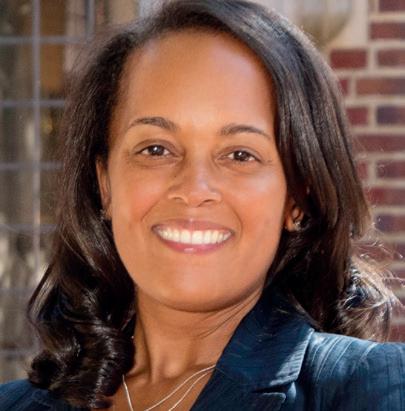
CAROL BROWN delivered the Distinguished Gifford Lecture at the University of Hawai’i at Manoa School of Law.
TARA CASEY was named one of the 2024 Influential Women of Law by Virginia Lawyers Weekly, as well as Virginia Business magazine’s Legal Elite in the Legal Services/Pro Bono category.
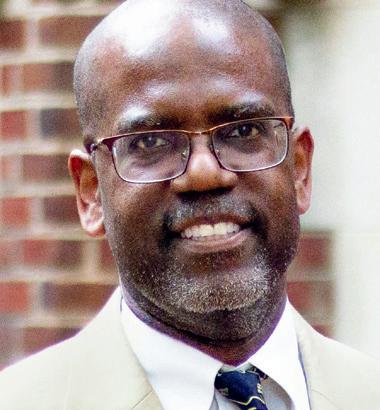
HANK CHAMBERS ’ article “Douglass, Lincoln, and Douglas Before Dred Scott: A Few Thoughts on Freedom, Equality, and Affirmative Action” was published in the Maryland Law Review.
JANICE CRAFT is the incoming chair of the Association of American Law Schools section on Balance & Well-Being in Legal Education.
REBECCA CROOTOF is the inaugural Visiting Scholar in Ethical, Legal, and Societal Implications (ELSI) at the Defense Advanced Research Projects Agency (DARPA). In this role, she lends her expertise to a broad range of highly consequential science and technology programs as they are being developed.
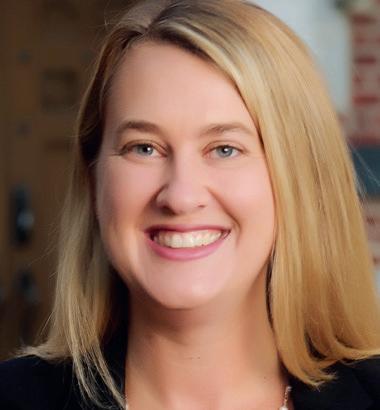
JESSICA ERICKSON co-authored amicus briefs in the Delaware Court of Chancery and the Delaware Supreme Court on fee awards in shareholder lawsuits. These briefs are based on empirical studies that she and her co-authors conducted related to similar litigation in federal court.
CORINNA LAIN ’s article “The Role of Deinstitutionalization in Our Mass Incarceration Nation” will be published in William & Mary Law Review. She was interviewed by the BBC about the controversial use of nitrogen gas in the execution of a prisoner by the state of Alabama.

KURT LASH ’s article “Roe and the Original Meaning of the Thirteenth Amendment” was published in the Georgetown Journal of Law & Public Policy, and “The Federalist and the Fourteenth Amendment — Publius in Antebellum Public Debate, 1788–1860” was published in BYU Law Review
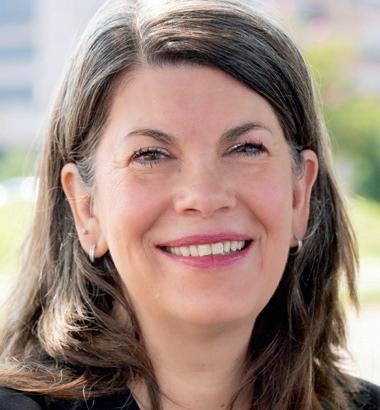
JULIE MCCONNELL presented “Unshackled: Righting the Wrongs of the Past — Stories of Redemption and Second Chances for Youthful Offenders” at the Ninth Biennial Applied Legal Storytelling Conference.
MOLLY LENTZ-MEYER ’s article “An Interdisciplinary Approach to the Legal History of Northern Ireland (1921-1948): Methods and Sources” will be published in the University of Aberdeen’s Granite Journal
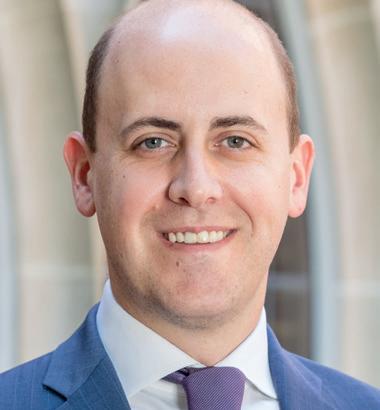
LUKE NORRIS received the Junior Scholarship Award by the AALS Section on Civil Procedure for “The Promise and Perils of Private Enforcement” published in Virginia Law Review. His article “The Oligarchic Courthouse: Jurisdiction, Corporate Power, and Democratic Decline” was published in Michigan Law Review
KRISTEN OSENGA ’s article “Hit the Road, Jack: The Auto Industry as the Next Vehicle for Predatory Infringement” was published in the Berkeley Technology Law Journal. She also presented “SEP Licensing & FRAND Issues: Where Are the Hotspots?” at the Center for Intellectual Property and Innovation Policy’s annual fall conference.
WENDY PERDUE , HANK CHAMBERS , and Professor Emeritus CLARK WILLIAMS were inducted into the Virginia Law Foundation Fellows Class of 2024. Nominated confidentially by their peers, fellows are recognized for leadership in their practices, their communities, and the commonwealth.
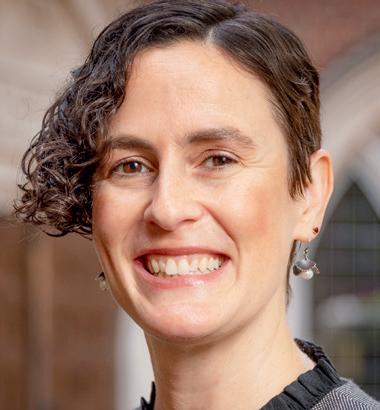
DORON SAMUELSIEGEL ’s new book, Fundamentals & Decision Points: An Empowered Approach to Legal Writing, was published by West Academic Publishing. Centering both traditional and critical approaches, as well as intercultural communication skills, the book helps students learn the fundamentals of deductive reasoning and CREAC (conclusion, rule, explanation, application, conclusion), while also introducing analytical and rhetorical tools for when existing laws or conventions are likely to produce injustice.
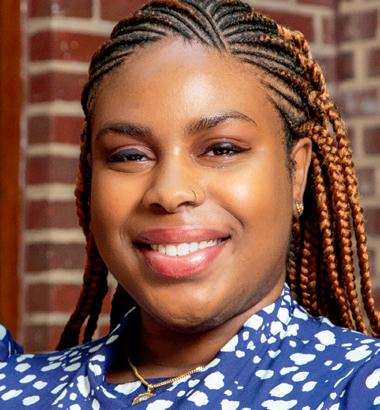
MARISSA JACKSON SOW authored a chapter, “A Seat at the Table: Black Women Public Intellectuals in U.S. History and Culture,” in More Than an Icon: Taking Shirley Chisholm at Her Word. She has also been awarded a grant from the Open Society Fellowship Advancement Fund in recognition of her ongoing work on Black feminist narratives.
DANIELLE STOKES ’ article “Response: Illuminating the Land-Energy Nexus” was published in Boston University Law Review
ALLISON TAIT authored “Family Trees and Family Fortunes,” a chapter in Inheritance Matters: Kinship, Property, Law
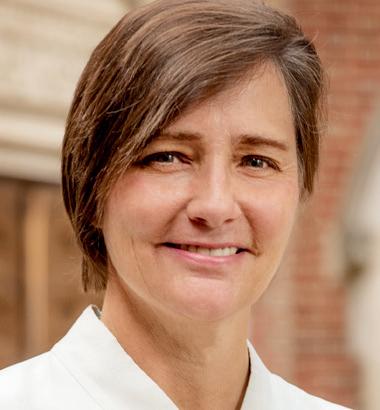
Under MARY TATE ’s leadership, the Institute for Actual Innocence and its wrongful convictions clinic was selected in a highly competitive application process to receive AI pro bono support through Relativity’s Justice for Change program.
Send your Class Note to classnotes@richmond.edu . To reach the alumni office, email lawalumni@richmond. edu or call 804-289-8028. Contact us by mail at Law Alumni, University of Richmond School of Law, University of Richmond, VA 23173.
TED CHANDLER, L’77 , spent a week on the trawler of daughter Becca Chandler Guillote, ’07, in September, cruising Puget Sound from Bainbridge Island to the San Juan Islands in Washington. Great weather, freshly caught rockfish, hiking, and time with 1-year-old Juniper Lee and son-in-law John made for a memorable adventure.
SALLY WOOD, W’69, G’70, AND L’80 , lives at the Cedarfield retirement community in Richmond, where she is the librarian and secretary of the Cedarfield Continuing Care Residents Association and enjoys water aerobics and dancing. She arranges speakers, too. In October, Peter Goodman, husband of Ann Russ Goodman, W’69, spoke about his specialty, gastroenterology.
Named for the year of the law school’s founding, the 1870 Society honors our most generous donors for their leadership support to Richmond Law.
As a society member, you can make a tremendous impact on the lawyers of tomorrow, our students. Put simply, as an 1870 Society member, you lead the way.
The photos here are from this year’s 1870 Society Reception.
LAURI DIENNO HOGGE, B’85 AND L’90 , joined seven women from the Class of 1985 for a gathering in Asheville, North Carolina, to celebrate all of them turning 60 this year. Attendees included Kirsten Johnson McGhee, B, Kathy McKenna Fay, B; Kirsten Richter Brown, B; Carolyn Totaro Sizemore, B; Cathy Cramton Turner, W; and Kim South Guy, W. “Still great friends after 42 years.”
BRIAN E. CURTIS, L’91 , general counsel at Colliers Engineering & Design, has been honored this year with the NJBIZ Leaders in Law Award. The honorees are chosen based on their dedication to the legal profession and to their communities. Brian is a principal at Colliers and a standing member of its executive committee leadership team.
ERIC HURLOCKER, ’87 AND L’92 , is retiring from the firm he co-founded, GreeneHurlocker. He will remain of coun-
sel. A prominent Virginia renewable energy attorney, he has been at the forefront of the growing renewable energy industry in the state and the mid-Atlantic for more than three decades. His work helped catapult renewable energy to the epicenter of today’s economy and resulted in the production of thousands of megawatts of clean energy. He recently spearheaded the firm’s endowment of a scholarship to encourage students with diverse cultural and economic backgrounds to earn law degrees at the University of Richmond.
DEBRA TEDESCHI VARNER, L’93 , became the president of the American College of Coverage Counsel on May 11, 2023. The ACCC is the preeminent association of U.S., Canadian, and Bermudan lawyers who represent the interests of insurers and policyholders.
BONNIE ATWOOD, L’96 , has been awarded second place for poetry by the National Federation of Press Women.
The Commercial Real Estate Women Network presented CARRIE HALLBERG O’MALLEY B’91, GB’96, AND L’96 , its first ESG Trailblazer Award for significant contributions to her company’s environmental, social, and governance goals. Carrie is a partner in the Hirschler law firm’s Fredericksburg, Virginia, office. She is chair of the Commercial Real Estate Finance and Investment Practice Group and leads the firm’s multidisciplinary commercial property assessed clean energy team. “Carrie’s inno-
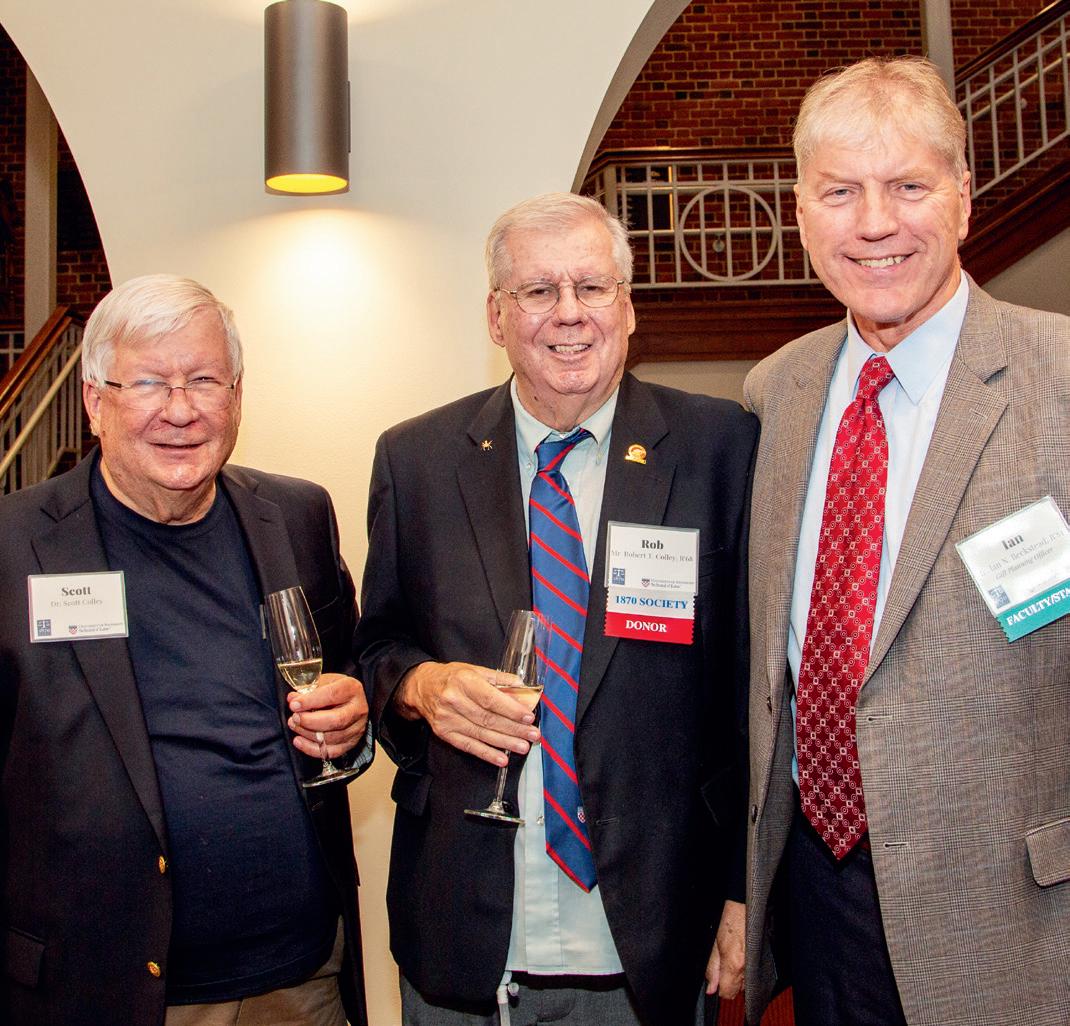

vative leadership drives real-world impact in all three phases of ESG and has led to her well-earned reputation as a trailblazer on a national stage within the legal and commercial real estate sectors,” said Courtney Paulk, president of Hirschler.
RICHARD B. CAMPBELL, L’93 , has published Gettin’ Kinda Itchie: The Groups That Made the Mamas & the Papas. He says the book “is based on four decades of interviews, collecting, and research.” The point of origin for the book has a UR connection. Richard explained that about the time he was discovering The Mamas & the Papas, a friend introduced him to one of her parents’ records by the Journeymen, the 1960s folk group of John Phillips, an original vocalist in The Mamas & the Papas. The Journeymen played at UR in 1962 and 1963. In fact, the parents had their first date at the 1963 UR Journeymen concert. “Fast-forward 40 years later, and I find myself the foremost authority on The Mamas & the Papas. Michelle Phillips (an original vocalist in the group) has dubbed me ‘the keeper of the flame’ for the group’s legacy.” Richard is an adjunct professor in the UR School of Law and previously taught in the School of Professional and Continuing Studies. More information about the book can be found at www.gettinkindaitchie.com or on the companion YouTube channel.
CARTER REID, L’93 , has retired as executive vice president, chief of staff, and corporate secretary of Dominion Energy.
She also served as president of Dominion Energy Services. Carter joined Dominion in 1996 as assistant general counsel. She was promoted to her final role in 2019.
ERIC A. GREGORY, ’96 AND L’02 , is county attorney for Southampton, Virginia. He is a partner at the Richmond-based firm Hefty, Wiley & Gore. The firm focuses on representing local governments and political subdivisions. Prior to joining the firm in 2012, Eric spent 12 years in state and local government law. He also serves as attorney for Emporia, Virginia.
JOSH CUMBOW, L’02 , is a commonwealth’s attorney in Washington County, Virginia, serving in his second four-year term.
KATHLEEN “KITTY” DICKERSON, L’02 , is chief prosecutor for Sussex County, Delaware. She had been an associate with the firm Morris James’ labor, employment, and education law practice. She also is a 19-year veteran with the Department of Justice, where she handled felony prosecutions of homicides, arsons, and white-collar crimes, culminating in her service as head of the special victims unit, where she prosecuted crimes against children.
JOANNA SUYES, L’07 , founded Suyes Law in Richmond, concentrating on Social Security disability claims.
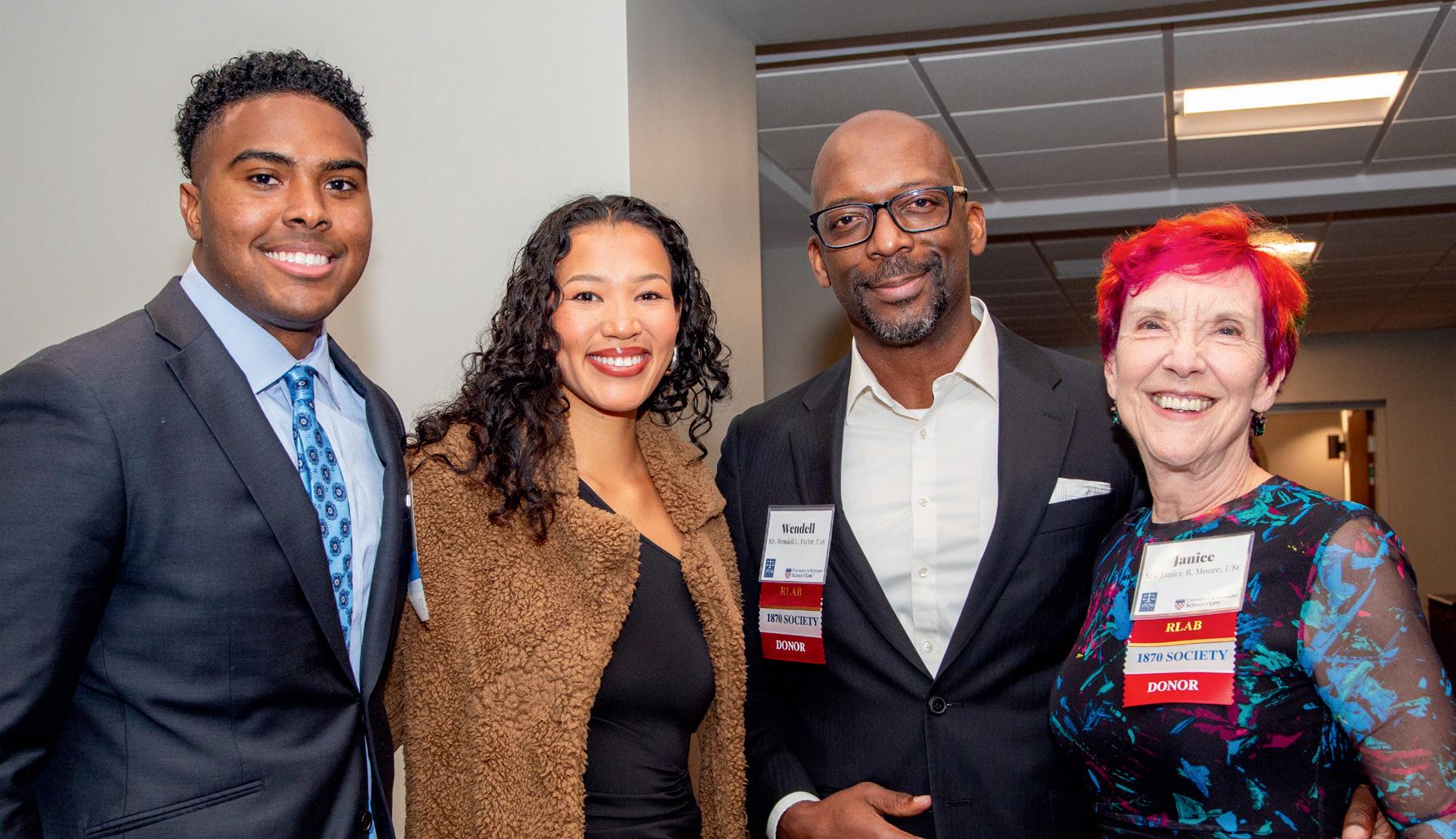

TOM GARRETT, L’03 , finished law school with an enduring takeaway: the cruciality of the First Amendment’s right to free speech.
“I’ve always had this — I don’t want to call it a contrarian streak; that’s probably too strong a word, though my friends might call it that — but this innate belief that everyone, regardless of their opinion or perspective, should have the ability to voice that opinion without fear of reprisal,” Garrett said. “People can, of course, disagree vigorously. But the idea that people should have to remain silent because their opinion is not accepted by the group has always been an issue for me.”
While Garrett remains a licensed attorney in good standing, his free speech advocacy evolved into a career in communications — most recently, and fittingly, as the chief communications officer at the Institute for Free Speech.
“The Institute for Free Speech is a nonpartisan nonprofit that engages in the litigation and protection of political speech rights,” Garrett said. “My job includes media relations, fostering publicity around our cases, and content creation” — responsibilities that target not only Garrett’s strengths, but also his connection to free speech advocacy.
“I think we’ve lost sight of [the fact that] it’s OK to disagree with someone who is a fellow classmate, fellow lawyer, fellow American, whatever,” Garrett says. “And part of what we’re doing is working to reinvigorate that idea.”
Garrett underwent a reinvigoration of his own in his transition to the communications field: “I’ve been pleasantly surprised at how many things have just popped back into my head [from law school]. I think that is a testament to the education I got from the University of Richmond and its First Amendment free speech [pedagogy.]”
—María Badillo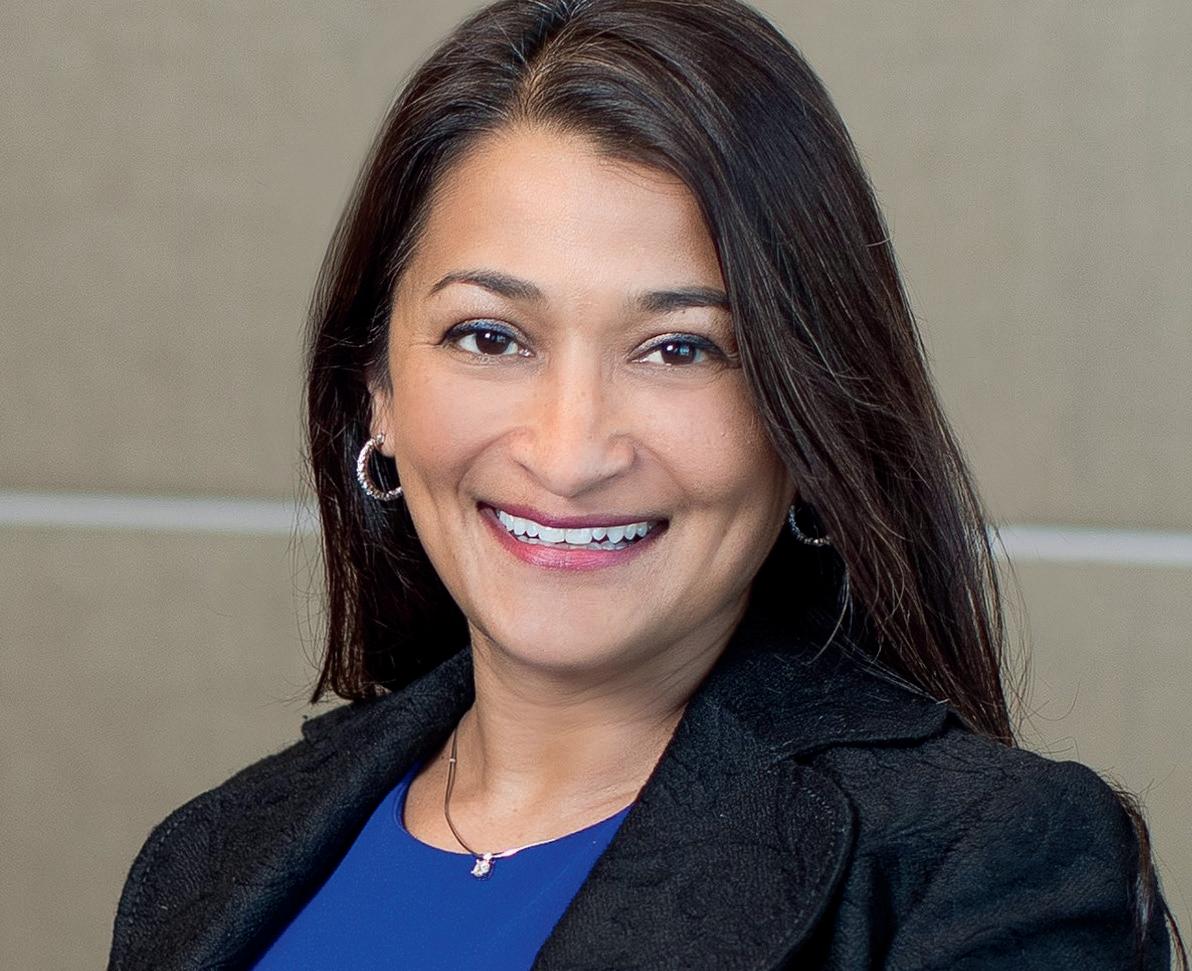
During a recent dinner with professor emeritus of law John Paul Jones, VISHWA BHARGAVA LINK, L’93 , was reminded of the valuable mentorship she received from him in law school. “He talked about having 300 or some very high number of people he has watched and mentored over all these years of being a professor,” Bhargava Link said. “He never made me feel like I was one of 300. I felt like No. 1.”
She credits Jones for influencing her in two ways. First, he introduced her to energy regulation law. Second, he exemplified the importance of giving back as your career grows.
Bhargava Link has come full circle. She is a partner with McGuireWoods in Richmond, chair of the firm’s regulatory and compliance practice, and mentor to a team of younger colleagues. She teaches them how to be an advocate, collaborate with experts in various fields, and weave together a persuasive story for each case.
For her, the most exciting thing about energy regulation law is the ability to tell a story. Utility companies need lawyers like Bhargava Link to assemble a case about why a project — such as an offshore wind plant — would benefit stakeholders like consumers, environmental groups, and the utility. She and her team of over 25 attorneys present these cases before the State Corporation Commission of Virginia, which makes the final decision if stakeholders cannot reach an agreement.
What Bhargava Link enjoys most is her work in advocacy. Now 30 years into her career, Bhargava Link’s guiding light is supporting not only her clients but also her team. She draws on her colleagues’ individual strengths and helps them hone their skills.
“I realize that practicing law is an apprenticeship, and the most rewarding part is building a team of young folks who see that this is something they could do for a career,” she said. “It’s important to give other people opportunities to be the front person so that they can get the wins, too.”
—Amy Ogle, ’26KELLY RENEE FINLEY, L’08 , accepted a solicitor position with the corporate team at BTO Solicitors, a Scottish law firm. She works out of the office in Edinburgh, Scotland. In 2022, she earned a Master of Laws with distinction in corporate and commercial law from the University of Dundee, Scotland, and became a qualified Scottish solicitor in 2023.
S. PAGE HIGGINBOTHAM III, C’11 AND L’16 , defeated an incumbent to become the top prosecutor in Orange County, Virginia. He says his goals are to “repair the relationship with law enforcement, hire and retain competent attorneys, show up in court well prepared, and prioritize better communication.”
The firm Bailey & Glasser has added J. LINCOLN WOLFE, L’21 , to the consumer protection practice group in its Charleston, West Virginia, office. He litigates on behalf of individuals and class members in cases involving debt collection, consumer finance, and other consumer and employment matters.
BRAYDEN MEADOWS, L’23 , has joined the law firm Steptoe & Johnson as an associate attorney. He practices in the Dallas office with a focus on general litigation. He was previously a summer associate at the firm.
KATIE ROSE, L’23 , the current Miss Virginia, promotes healthy choices and substance use prevention to students in Virginia elementary schools as part of the Virginia Alcoholic Beverage Control Authority’s Miss Virginia School Tour program. The program’s mission is to prevent high-risk and underage alcohol use.
JOSEPH P. RUSHBROOKE, L’58 , of Roanoke, Virginia, Nov. 8, 2023
DONALD B. “DON” VADEN, R’57 AND L’60 , of Midlothian, Virginia, Sept. 26, 2023
WILLIAM I. “BILL” BANDAS, L’63 , of Washington, D.C., Sept. 12, 2023
WILLIAM J. “BILL” STURGILL, L’63 , of Norton, Virginia, Sept. 27, 2023
JON C. POULSON, L’68 , of Accomac, Virginia, Nov. 5, 2023
LAURENS “LARRY” SARTORIS, L’70 , of Richmond, Virginia, Oct. 31, 2023
MATTHEW J. CODY JR., R’68 AND L’74 , or Abingdon, Virginia, Oct. 10, 2023
ARDIE L. ERVIN, L’77 , of Fishersville, Virginia, Nov. 9, 2023
BRUCE E. MAYER, L’79 , of Stewartsville, Virginia, Aug. 13, 2023
CATHERINE POWER TETI, L’79 , of Tampa, Florida, Oct. 17, 2023
STEPHEN A. “STEVE” HUDGINS, B’77 AND L’80 , of Poquoson, Virginia, Sept. 19, 2023
WILLIAM H. “HANK” SIPE III, L’83 , of Rock Hill, South Carolina, Aug. 8, 2023
GEORGE R. GRAY, L’87 , of New Kent, Virginia, Oct. 9, 2023
PETER K. OPPER, L’05 , of Henrico, Virginia, Nov. 24, 2023
“The fellowship funding allowed me to work closely with children’s rights advocates and explore my passion for indigent defense work.”
— Courtney Squires, L’24, a two-time fellowship recipient who completed internships at the Virginia Poverty Law Center and the Mecklenburg County Public Defender’s Office
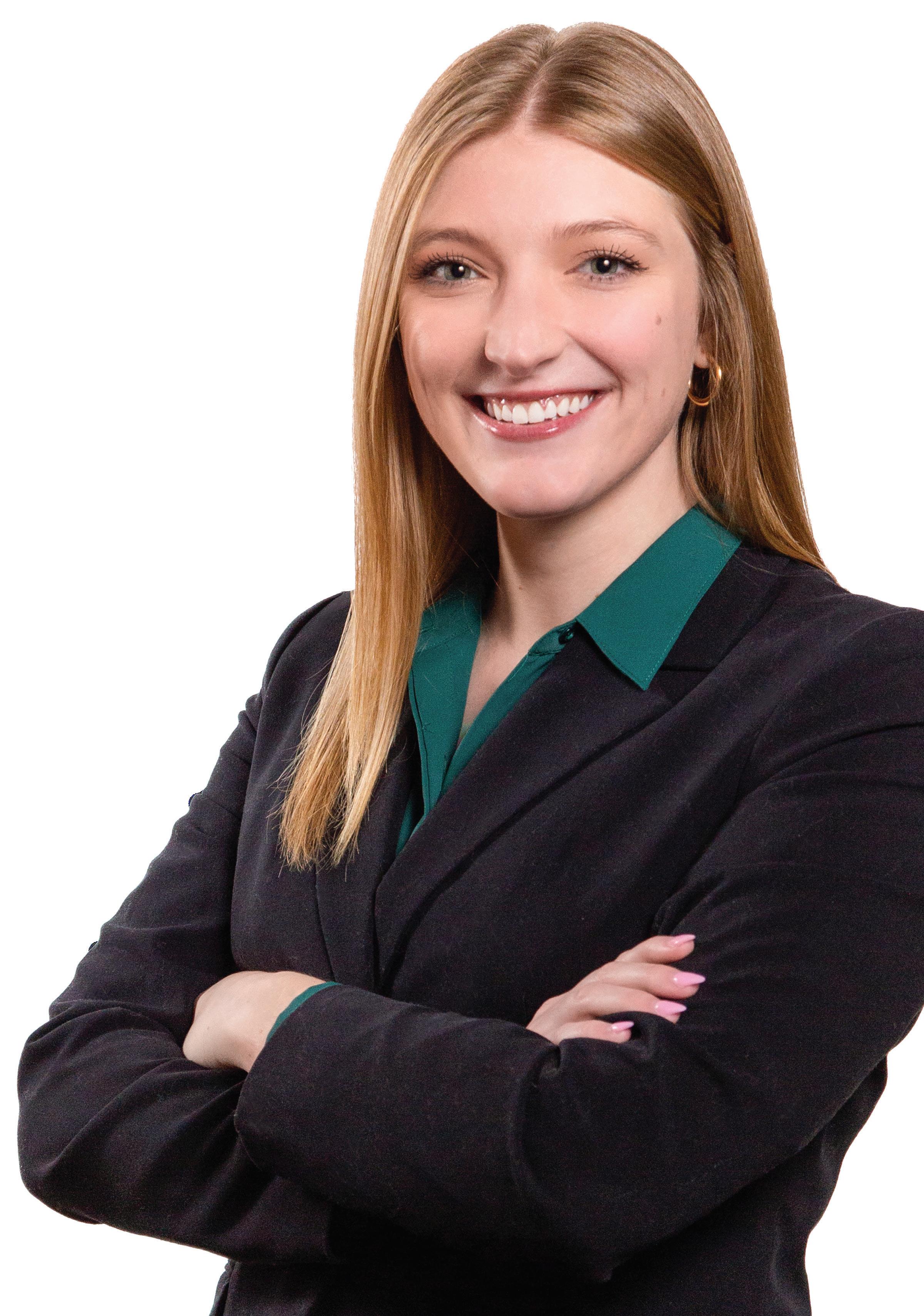
RICHMOND IS ONE OF THE ONLY LAW SCHOOLS in the country to guarantee every student a summer in public service.
Every summer, about 130 Law Spiders receive a $3,500 fellowship to complete an unpaid legal internship in government or a nonprofit. These fellowships allow them to put theory into practice, gaining critical experience while serving the community.
Your gift to the Richmond Law Fund provides students like Courtney with opportunities that they otherwise would not have.
203 Richmond Way
University of Richmond, VA 23173
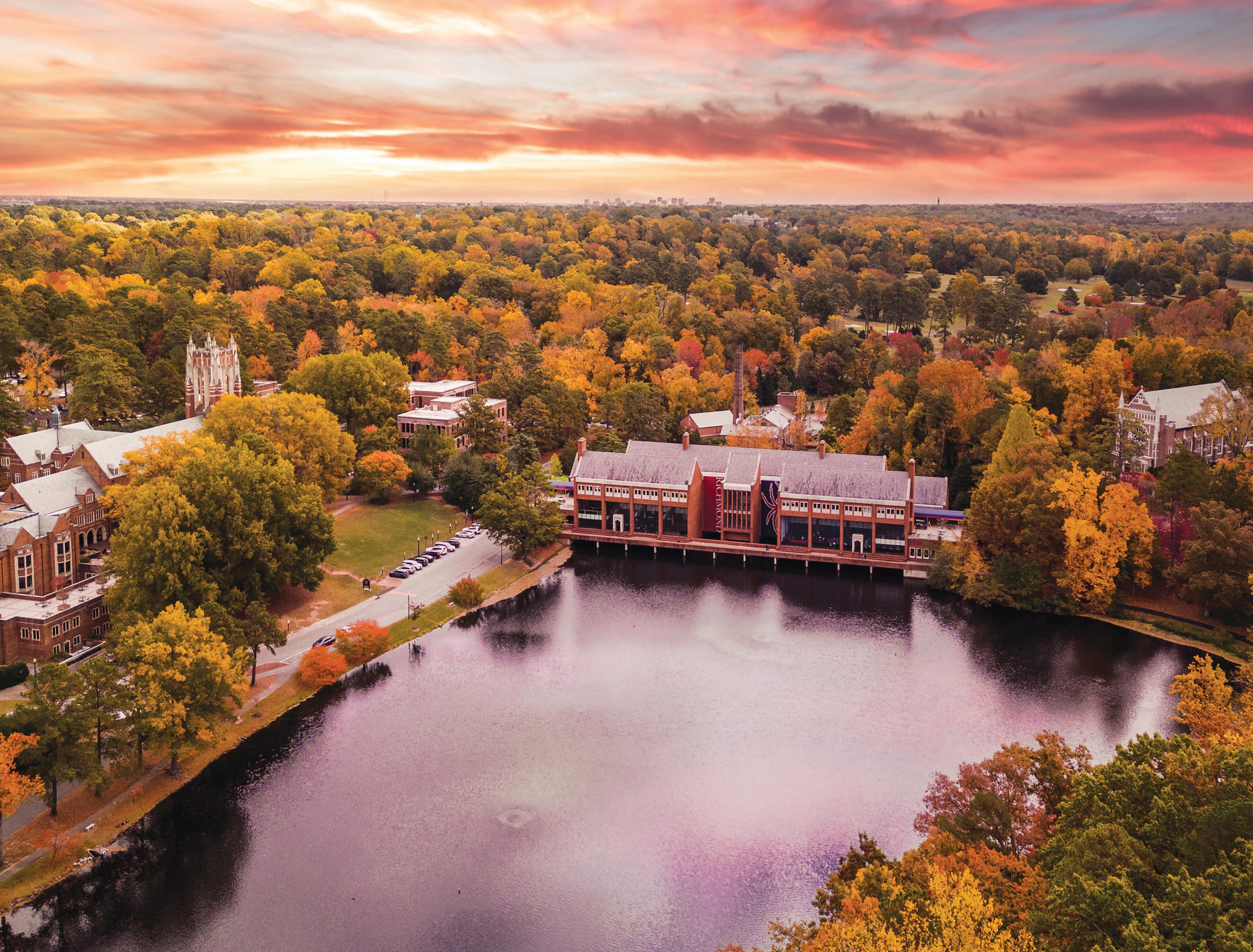
MAY 17–18
We look forward to seeing you back on campus for a weekend full of fun and connection. Activities are open to all law alumni, with special events reserved for reunion classes ending in 4 and 9.
For more information, please visit law.richmond.edu/alumni/reunion/